#I was really just using it as a news aggregator
Explore tagged Tumblr posts
Text
it's not worth getting into the details, but a complete stranger on threads managed to say something so deeply triggering and hurtful about my decision to start a family that I bawled my eyes out in real life, to the point that my partner thought I was like, about to die or something, so uh..... think I'm officially done with that algorithmic garbage fire...........
#I was really just using it as a news aggregator#and it's been failing at THAT basic task pretty consistently#so uh#time to move the fuck on#social media is a toxic wasteland#be kind to one another please
11 notes
·
View notes
Note
Hey, ive been really interested in your book but ive heard a whole lot of chaos that comes from companies taking money from the authors and since I dont know anything for sure, do you have a place where I can buy your book and be sure you receive as much as possible?
The main place to get my book would be from Amazon at the moment. I will look more closely at other options, but as of right now, they're the only ones who will print on demand and take care of basically the whole process for me when someone orders. They aren't much more helpful with selling than traditional publishers, but the main thing they are is *accessible*
If someone finds me a service that's easy to use, easy to access, does all the work like Amazon does, and pays better, I desperately hope they'll let me know because there are eleventy billion publishers out there and they ALL SWEAR to be the best thing for authors on the planet.
Researching this type of thing is extremely time consuming and I don't know if I can trust aggregators to compare and contrast them in an honest way so that I can make the best decision
Because when I choose a new publisher, I would like them to be my publisher for life. I don't want to make this choice again. This has been years, and it's only getting harder and more companies are being scammy and stupid and predatory. At least with Amazon I know what I'm getting
Goodness, I kinda didn't mean to info dump like this, but I need to put this information out into the world because I actually need help with this. Everybody thinks *their* publishing company is the best, but then when I look into them, there are massive problems even getting the book into their system. Or it costs money. Or the quality sucks. Or the wait times suck for customers. Or the pay rate isn't any higher after all the fees
I'm not just writing. I have an entire life to take care of, and this would take many, many, MANY hours to research.
Please, if someone is willing to help????
1K notes
·
View notes
Text
So, let me try and put everything together here, because I really do think it needs to be talked about.
Today, Unity announced that it intends to apply a fee to use its software. Then it got worse.
For those not in the know, Unity is the most popular free to use video game development tool, offering a basic version for individuals who want to learn how to create games or create independently alongside paid versions for corporations or people who want more features. It's decent enough at this job, has issues but for the price point I can't complain, and is the idea entry point into creating in this medium, it's a very important piece of software.
But speaking of tools, the CEO is a massive one. When he was the COO of EA, he advocated for using, what out and out sounds like emotional manipulation to coerce players into microtransactions.
"A consumer gets engaged in a property, they might spend 10, 20, 30, 50 hours on the game and then when they're deep into the game they're well invested in it. We're not gouging, but we're charging and at that point in time the commitment can be pretty high."
He also called game developers who don't discuss monetization early in the planning stages of development, quote, "fucking idiots".
So that sets the stage for what might be one of the most bald-faced greediest moves I've seen from a corporation in a minute. Most at least have the sense of self-preservation to hide it.
A few hours ago, Unity posted this announcement on the official blog.
Effective January 1, 2024, we will introduce a new Unity Runtime Fee that’s based on game installs. We will also add cloud-based asset storage, Unity DevOps tools, and AI at runtime at no extra cost to Unity subscription plans this November. We are introducing a Unity Runtime Fee that is based upon each time a qualifying game is downloaded by an end user. We chose this because each time a game is downloaded, the Unity Runtime is also installed. Also we believe that an initial install-based fee allows creators to keep the ongoing financial gains from player engagement, unlike a revenue share.
Now there are a few red flags to note in this pitch immediately.
Unity is planning on charging a fee on all games which use its engine.
This is a flat fee per number of installs.
They are using an always online runtime function to determine whether a game is downloaded.
There is just so many things wrong with this that it's hard to know where to start, not helped by this FAQ which doubled down on a lot of the major issues people had.
I guess let's start with what people noticed first. Because it's using a system baked into the software itself, Unity would not be differentiating between a "purchase" and a "download". If someone uninstalls and reinstalls a game, that's two downloads. If someone gets a new computer or a new console and downloads a game already purchased from their account, that's two download. If someone pirates the game, the studio will be asked to pay for that download.
Q: How are you going to collect installs? A: We leverage our own proprietary data model. We believe it gives an accurate determination of the number of times the runtime is distributed for a given project. Q: Is software made in unity going to be calling home to unity whenever it's ran, even for enterprice licenses? A: We use a composite model for counting runtime installs that collects data from numerous sources. The Unity Runtime Fee will use data in compliance with GDPR and CCPA. The data being requested is aggregated and is being used for billing purposes. Q: If a user reinstalls/redownloads a game / changes their hardware, will that count as multiple installs? A: Yes. The creator will need to pay for all future installs. The reason is that Unity doesn’t receive end-player information, just aggregate data. Q: What's going to stop us being charged for pirated copies of our games? A: We do already have fraud detection practices in our Ads technology which is solving a similar problem, so we will leverage that know-how as a starting point. We recognize that users will have concerns about this and we will make available a process for them to submit their concerns to our fraud compliance team.
This is potentially related to a new system that will require Unity Personal developers to go online at least once every three days.
Starting in November, Unity Personal users will get a new sign-in and online user experience. Users will need to be signed into the Hub with their Unity ID and connect to the internet to use Unity. If the internet connection is lost, users can continue using Unity for up to 3 days while offline. More details to come, when this change takes effect.
It's unclear whether this requirement will be attached to any and all Unity games, though it would explain how they're theoretically able to track "the number of installs", and why the methodology for tracking these installs is so shit, as we'll discuss later.
Unity claims that it will only leverage this fee to games which surpass a certain threshold of downloads and yearly revenue.
Only games that meet the following thresholds qualify for the Unity Runtime Fee: Unity Personal and Unity Plus: Those that have made $200,000 USD or more in the last 12 months AND have at least 200,000 lifetime game installs. Unity Pro and Unity Enterprise: Those that have made $1,000,000 USD or more in the last 12 months AND have at least 1,000,000 lifetime game installs.
They don't say how they're going to collect information on a game's revenue, likely this is just to say that they're only interested in squeezing larger products (games like Genshin Impact and Honkai: Star Rail, Fate Grand Order, Among Us, and Fall Guys) and not every 2 dollar puzzle platformer that drops on Steam. But also, these larger products have the easiest time porting off of Unity and the most incentives to, meaning realistically those heaviest impacted are going to be the ones who just barely meet this threshold, most of them indie developers.
Aggro Crab Games, one of the first to properly break this story, points out that systems like the Xbox Game Pass, which is already pretty predatory towards smaller developers, will quickly inflate their "lifetime game installs" meaning even skimming the threshold of that 200k revenue, will be asked to pay a fee per install, not a percentage on said revenue.
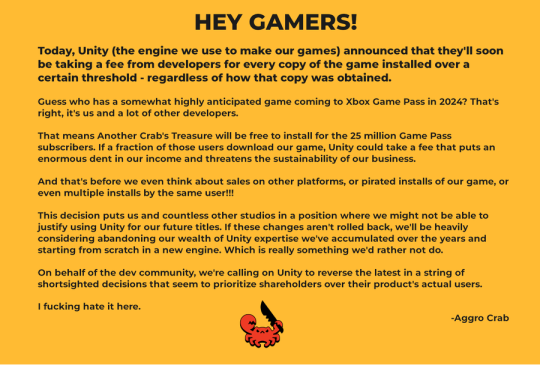
[IMAGE DESCRIPTION: Hey Gamers!
Today, Unity (the engine we use to make our games) announced that they'll soon be taking a fee from developers for every copy of the game installed over a certain threshold - regardless of how that copy was obtained.
Guess who has a somewhat highly anticipated game coming to Xbox Game Pass in 2024? That's right, it's us and a lot of other developers.
That means Another Crab's Treasure will be free to install for the 25 million Game Pass subscribers. If a fraction of those users download our game, Unity could take a fee that puts an enormous dent in our income and threatens the sustainability of our business.
And that's before we even think about sales on other platforms, or pirated installs of our game, or even multiple installs by the same user!!!
This decision puts us and countless other studios in a position where we might not be able to justify using Unity for our future titles. If these changes aren't rolled back, we'll be heavily considering abandoning our wealth of Unity expertise we've accumulated over the years and starting from scratch in a new engine. Which is really something we'd rather not do.
On behalf of the dev community, we're calling on Unity to reverse the latest in a string of shortsighted decisions that seem to prioritize shareholders over their product's actual users.
I fucking hate it here.
-Aggro Crab - END DESCRIPTION]
That fee, by the way, is a flat fee. Not a percentage, not a royalty. This means that any games made in Unity expecting any kind of success are heavily incentivized to cost as much as possible.

[IMAGE DESCRIPTION: A table listing the various fees by number of Installs over the Install Threshold vs. version of Unity used, ranging from $0.01 to $0.20 per install. END DESCRIPTION]
Basic elementary school math tells us that if a game comes out for $1.99, they will be paying, at maximum, 10% of their revenue to Unity, whereas jacking the price up to $59.99 lowers that percentage to something closer to 0.3%. Obviously any company, especially any company in financial desperation, which a sudden anchor on all your revenue is going to create, is going to choose the latter.
Furthermore, and following the trend of "fuck anyone who doesn't ask for money", Unity helpfully defines what an install is on their main site.
While I'm looking at this page as it exists now, it currently says
The installation and initialization of a game or app on an end user’s device as well as distribution via streaming is considered an “install.” Games or apps with substantially similar content may be counted as one project, with installs then aggregated to calculate the Unity Runtime Fee.
However, I saw a screenshot saying something different, and utilizing the Wayback Machine we can see that this phrasing was changed at some point in the few hours since this announcement went up. Instead, it reads:
The installation and initialization of a game or app on an end user’s device as well as distribution via streaming or web browser is considered an “install.” Games or apps with substantially similar content may be counted as one project, with installs then aggregated to calculate the Unity Runtime Fee.
Screenshot for posterity:

That would mean web browser games made in Unity would count towards this install threshold. You could legitimately drive the count up simply by continuously refreshing the page. The FAQ, again, doubles down.
Q: Does this affect WebGL and streamed games? A: Games on all platforms are eligible for the fee but will only incur costs if both the install and revenue thresholds are crossed. Installs - which involves initialization of the runtime on a client device - are counted on all platforms the same way (WebGL and streaming included).
And, what I personally consider to be the most suspect claim in this entire debacle, they claim that "lifetime installs" includes installs prior to this change going into effect.
Will this fee apply to games using Unity Runtime that are already on the market on January 1, 2024? Yes, the fee applies to eligible games currently in market that continue to distribute the runtime. We look at a game's lifetime installs to determine eligibility for the runtime fee. Then we bill the runtime fee based on all new installs that occur after January 1, 2024.
Again, again, doubled down in the FAQ.
Q: Are these fees going to apply to games which have been out for years already? If you met the threshold 2 years ago, you'll start owing for any installs monthly from January, no? (in theory). It says they'll use previous installs to determine threshold eligibility & then you'll start owing them for the new ones. A: Yes, assuming the game is eligible and distributing the Unity Runtime then runtime fees will apply. We look at a game's lifetime installs to determine eligibility for the runtime fee. Then we bill the runtime fee based on all new installs that occur after January 1, 2024.
That would involve billing companies for using their software before telling them of the existence of a bill. Holding their actions to a contract that they performed before the contract existed!
Okay. I think that's everything. So far.
There is one thing that I want to mention before ending this post, unfortunately it's a little conspiratorial, but it's so hard to believe that anyone genuinely thought this was a good idea that it's stuck in my brain as a significant possibility.
A few days ago it was reported that Unity's CEO sold 2,000 shares of his own company.
On September 6, 2023, John Riccitiello, President and CEO of Unity Software Inc (NYSE:U), sold 2,000 shares of the company. This move is part of a larger trend for the insider, who over the past year has sold a total of 50,610 shares and purchased none.
I would not be surprised if this decision gets reversed tomorrow, that it was literally only made for the CEO to short his own goddamn company, because I would sooner believe that this whole thing is some idiotic attempt at committing fraud than a real monetization strategy, even knowing how unfathomably greedy these people can be.
So, with all that said, what do we do now?
Well, in all likelihood you won't need to do anything. As I said, some of the biggest names in the industry would be directly affected by this change, and you can bet your bottom dollar that they're not just going to take it lying down. After all, the only way to stop a greedy CEO is with a greedier CEO, right?
(I fucking hate it here.)
And that's not mentioning the indie devs who are already talking about abandoning the engine.
[Links display tweets from the lead developer of Among Us saying it'd be less costly to hire people to move the game off of Unity and Cult of the Lamb's official twitter saying the game won't be available after January 1st in response to the news.]
That being said, I'm still shaken by all this. The fact that Unity is openly willing to go back and punish its developers for ever having used the engine in the past makes me question my relationship to it.
The news has given rise to the visibility of free, open source alternative Godot, which, if you're interested, is likely a better option than Unity at this point. Mostly, though, I just hope we can get out of this whole, fucking, environment where creatives are treated as an endless mill of free profits that's going to be continuously ratcheted up and up to drive unsustainable infinite corporate growth that our entire economy is based on for some fuckin reason.
Anyways, that's that, I find having these big posts that break everything down to be helpful.
#Unity#Unity3D#Video Games#Game Development#Game Developers#fuckshit#I don't know what to tag news like this
6K notes
·
View notes
Text
What to post about on Dreamwidth
There's a question that may be on a lot of minds right now, that some people may be afraid to ask. Or you might not even think to ask it until after you're in deep enough that you'll feel silly for doing so! So let's get it out of the way ASAP.
"But what do I even post on Dreamwidth? Don't all posts there need to be super long and thoughtful?"
Not even a little bit! As with any social media site, posting is the blood that keeps social interactions going. You can get into comments, yes, but those happen best with posts! But with the (I'm sorry to say) sub-par image hosting interface on Dreamwidth (that will hopefully be fixed someday, but probably is at least several years out, I'm even sorrier to say), people who are used to an image-heavy social media site might be a bit daunted by Dreamwidth's text-heavy interface. So here's some ideas of things you can post:
Shitposts. It is entirely fine, okay, and even wonderful to make shitposts on Dreamwidth! Since Dreamwidth isn't a content aggregation site and doesn't have built-in reblogging, you probably shouldn't expect them to go very far (unless a member of metaquotes sees them and wants to share), but they're still welcome 👍
GIPs, or, Gratuitous Icon Posts! Free users get a total of 15 icons to use like reaction images and gifs, and sometimes when you upload one, you just want to share it with everyone right away! That's when you make a Gratuitous Icon Post. You can literally just make a post using that icon, and then put GIP in the text field, and boom! You're done.
Steal some prompts from sunshine_challenge, snowflake_challenge, or thefridayfive. While you can also do any of these challenges in real time, there's nothing stopping you from doing them whenever you want, and The Friday Five has a huge number of back-posts to dig through. Just go back a few pages on the main community page, pick a day with questions you like the look of, and post those (with your answers) to your journal!
Do you have a pet? Or more than one? Post about what they're doing right this second. Someone's bound to be interested in that!
To-do lists. Not only can it be helpful to have these actually written out, some of your followers may chime in to root for you to do them!
Media reviews in three sentences or less. Of course you can make them longer if you want, but if you're just looking to get a quick post out, this one might be pretty fun.
Something you're looking forward to! It doesn't have to be a big thing, even something like, "I can't wait for my next afternoon nap!" or "I just bought a new book and I'm really looking forward to reading it!" or "I wanna go home so I can pet my dog so bad!" Any of those would be a fine post.
Three (or more) Things Make a List: If you've got at least three things you've been meaning to post about, but don't have a lot to say about any of them, jumble them all together in the same post! Pretty sure this tradition dates back farther than Dreamwidth, though damned if I could say where it started.
It may not seem like these ideas have a lot in common, but one thing they're all good for is starting a conversation with your followers. And that's at least half the fun of Dreamwidth, IMO.
There's more ideas out there, but these should at least get you started. And if you keep it up, you'll have the hang of Dreamwidth in no time 😉
#let me tell you about#dreamwidth#let me tell you about dreamwidth#dreamwidth help#dreamwidth how to#dreamwidth 101
146 notes
·
View notes
Text

You have questions! We might have answers.
What is this collection?
As Maria puts it: this collection is a critical look at some of the things that we, the editors, think have made CQL such a hit around the world. Of course, part of that success comes from the webnovel MDZS and the show CQL themselves—we love the characters, the mystery, and the drama, who doesn’t?! However, the authors in our book also look at topics like translating danmei (both officially and unofficially), adapting danmei for new audiences, and interacting with fandoms and fanworks. The larger argument of the book is that all of these things played a huge role in CQL’s visibility and success, and we wanted to start making those moving pieces visible, especially for audiences who mainly watched CQL in translation.
You keep using the word “academic”—what does that mean, exactly?
Maria: Ok, not to get pedantic here, but this actually touches on some things that I’m really excited about for the book. Traditionally, academic work is written by people who have a deep expertise in the subject (signified by having a PhD and doing specific kinds of research), and then the work itself is peer-reviewed (i.e., sent to other experts in the field for them to evaluate whether it’s sound, original, and interesting enough to publish, without knowing who wrote it). And both of these things are true about our book—our authors have deep knowledge and the book was peer reviewed—but also. We specifically asked for chapters from younger scholars and from fans who also have deep knowledge about topics that academia doesn’t always know or value enough, and we include an interview from the fan-translator K. who did the Exiled Rebels translation. So the hope is that: this book is academic, and also—more!
Who are you?
Yue studies adaptation, fantasy, and popular culture texts using a feminist lens. She wrote an early, influential article about danmei adaptations and also has a book about feminist adaptations of Chinese fantasy.
Maria studies fanworks, contemporary fantasy, and genre literature. She’s scrambling to finish her dissertation right now.
How were the chapter spotlights chosen?
Voluntarily! The concept of a small social media promo was kicked around by some of the contributors and those interested in the idea filled out a short interview with what they wanted to share. We'll be posting about 2 introductions and 2 spotlights a day for the next week or so!
Who's running this social media campaign anyway?
Not the publishers! A few enthusiastic collection contributors got together and, with the assistance of the editors, have put this promotion together. We do not in any way represent Peter Lang in an official capacity! We just worked hard and wanted to share. :)
Are you making any money off of royalties from this book?
LOL not even remotely
What about this promotion?
also no. alas
Where can I find this book?
You can find our listing on Peter Lang’s website here. As for other retailers, a quick search should turn us up!
How can I access this book if I cannot buy it from Peter Lang / [book retailer of choice]?
As collection editors and contributors who signed a legal agreement with Peter Lang, we have granted Peter Lang exclusive right and license to edit, adapt, publish, reproduce, distribute, display, and store our contributions, and we must cooperate fully with the Publisher if the Publisher believes a third party is infringing or is likely to infringe copyright in the contribution.
That being said, these are academic papers, which means that contributors may make copies of the contribution for classroom teaching use! (These copies may not be included in course pack material for onward sale by libraries and institutions). Of course, any linking, collection or aggregation of chapters from the same volume is strictly prohibited.
(FAQ may be updated periodically!) (all posts on Catching Chen Qing Ling)
#MDZS#CQL#The Untamed#Grandmaster of Demonic Cultivation#Catching Chen Qing Ling#CQL academic collection#CQL CFP#Chen Qing Ling#Mo Dao Zu Shi#CQL meta#MDZS meta
354 notes
·
View notes
Text
Professor Riorson (Remi's Version)
"Remi for once can you please—" "Be an attentive student?" I widen my eyes. "Pay attention in class?" I just my lower lip out. "Of course!" My lips curve up. "I'm so excited to have a new teacher, Vi."


Hello! After what we shall henceforth refer to as the Onyx Storm Incident, I did not know if I would ever write for this fandom again (yes, that was three days ago, I know, shut up).
Anyway, I figured I should try and push through my reservations early instead of letting my disappointment linger, so I set out to write a little palette cleanser. As usual I tried to write smut and ended up with four thousand words of feelings first 🤦🏼♀️
This is set in some sort of alternate (completely unbelievable) universe where Xaden never gave in to Remi's flirting when she was a first-year at Basgiath (oh and he's not a venin) everything else is irrelevant, just go with it.
It's also basically straight up erotica, so explicit content! Not for minors! Minors DNI or whatever the fuck they say over here (I really should be posting all these on AO3, but that's for another day).
Finally, I'm sorry to all the teachers out there, I hate this kink too but it's minimally emphasised (they're still them) and it was what my girl Remi deserved—why should Violet get Professor Riorson and not her, the Queen of Tyrrendor, the Angel of Death? So here we are.
PS. Justice for chairs! Hopefully you can all visualise what's going on here 😂🪑


Professor Riorson (Remi's Version)
Fraternisation between cadets and those serving in higher chains of command, including the aggregate leadership cadré at Basgiath War College, is strictly forbidden. —Article Eight, Section One, The Dragon Rider’s Codex

I tap my foot against the floor, levitating my pen above my hand almost subconsciously as Professor Devera informs the rest of the cadets just how fucked we actually are. "Welcome to the new face of battle, where we are not only outnumbered in the sky but now equally matched on the field in terms of the skill of our opponents."
Equally matched? We're not equally matched, we're absolutely fucked. It's hard to find the energy to care anymore, knowing what awaits us. Maybe if I had a signet like Violet's, I would be in with half a chance at survival, but mending? Yeah. I'm screwed.
Heads drop in the rows ahead of us, like everyone else is reaching the same conclusion.
"With that in mind, the nature of challenges will change under the supervision of Professor Emetterio to include wielding in order to better prepare you for actual combat. Death is no longer an acceptable outcome when you face your classmates. The days of settling your scores on the mat are over. We need each and every one of you to survive to graduation.”
I scoff aloud, drawing more than one person's attention. Death should never have been acceptable. The military, the system gains nothing from it, it's just a senseless waste of life.
“Easy to say when you’re not facing Sorrengail,” Caroline Ashton calls out.
My lips tilt up. I hope she ends up facing my sister.
“We aren’t going to throw you to the wolves,” Devera tells her. “The third class you’ll be adding will be a hands-on approach to prepare you for signet-against-signet combat. You’ll have a rotating roster of professors to benefit from all signet types, and the Eastern Wing has temporarily loaned us their most powerful rider to start your instruction.”
Violet stiffens beside me and I frown, glancing over at her. The Eastern Wing…wouldn't that mean…
“And on that note.” Devera gestures to the door at the back of the room, and slowly, I turn. “Look who just arrived—everyone, welcome our newest member of your leadership team. Professor Riorson.”
My heart skips a beat and my lips begin to curve into the most self-satisfied smirk I've worn in a while. This is going to be fun.

Friday comes far too slowly for my liking, but finally it's our turn to head out to the Infantry Quadrant's outdoor amphitheatre. There's a skip in my step as we descend the stairs and Violet groans, eyeing me with disapproval.
"Remi for once can you please—"
"Be an attentive student?" I widen my eyes. "Pay attention in class?" I just my lower lip out. "Of course!" My lips curve up. "I'm so excited to have a new teacher, Vi."
Ridoc snorts, bumping me with his hip as he passes.
I glance up from my feet, taking in the man standing dead centre in the base of the amphitheatre, his impatience clear. His arms are crossed over his chest and his usual dark stare is ever-present as he watches us, waiting.
"This is incredible." Sloane is saying ahead of us, commenting on the weather and the temperature inside the amphitheatre's wards. It is warm in here and as Professor Riorson's eyes dart up to lock with mine, I shrug my arms out of my flight jacket. My pulse jumps at his continued attention and slowly I shake the snow from my braid.
"You're right, Sloane." I smile, running my hand over my hair. "It's so warm in here." I reach for the bottom of my shirt and draw that up too, pulling it over my head to leave me in just my leather pants and armoured corset.
"Remi!" Violet hisses and I smile innocently.
"What?" I lift a brow. "You don't want me to pass out, do you Vi?" She grumbles something about knocking me out, which I promptly ignore, dropping my things in the first row of stone seats beside our classmates.
If there's one thing my sister has always hated, it's my infatuation with Xaden Riorson. I suppose that's fair, given she shares a mind with him at times, but it does nothing to discourage me. If I see something I want, I go after it and I've wanted Xaden Riorson ever since I first laid eyes on him all those years ago at parapet.
Too bad he doesn't want me just as badly.
“Welcome to your first session of Signet Sparring, in what I like to call the pit.” He announces as we reach the base of the steps.
"Ominous." I mutter.
“Those who can wield, keep your feet on the rock but—and I cannot stress this enough—off the mat. Those who cannot, take a seat in the first row.” He gestures to the terraced stone behind us.
I assume it has something to do with the warding, so when Aaric and Lynx move to take a seat in the rows behind, I stand to follow.
"Remi Sorrengail!" Riorson calls. "I know you can wield."
I pause, turning slightly to arch a brow. "My signet is neither offensive nor defensive, sir." The slightest, most minuscule twitch jolts his shoulders at the word and I show him my teeth. "You wouldn't want me to get hurt, would you?"
An ember of desire flickers to life in my gut and I bite my lip, letting my eyes drag over him slowly from head to toe. The tight-fitting sparring gear is reminiscent of what he always wore in the quadrant when he was our wingleader, but the swords strapped across his back…they really add to it. It's doing something for me. A lot for me.
"I'll make sure you don't get hurt, Cadet Sorrengail." He reassures. "Take a seat. Now."
I hold his gaze for a moment, wishing he could read my mind and understand exactly what that tone is doing for me. For a second his eyes flare and then it's gone; his stony, unaffected mask falling back into place as he gestures to the first row where my sister waits.
"Whatever you say, sir." I simper, flopping down onto the stone.
"Sickening." Imogen mutters, rolling her eyes from my other side, and I grin. She's never liked my obsession with him either.
First wing begin to filter in, taking their places on the adjacent seating and Riorson's eyes dart left, then right. “Let’s go. It shouldn’t be this hard to sort yourselves out."
"You can sort me out—" All the breath rushes out of me in a wheeze as Imogen's elbow plants itself in my gut. "Ok." I cough, "understood." Violet stifles a laugh.
“You done gossiping among yourselves?” Riorson eyes First Wing with what I'd classify as menace.
“We were just saying that we’re not sure someone who graduated less than a year ago makes the best teacher.” Loran Yashil folds his arms.
I laugh aloud, drawing the attention of everyone in the amphitheatre. "Because you've been doing so well with Carr." I comment. "How many dark wielders do you think he's fought? Hiding back here behind the wards like a coward?"
"Remi!" Violet groans, though the chastisement holds no sting—I know she agrees with me.
What follows is perhaps the hottest display of power and dominance I've seen in a long while. He barely lifts a finger taking the third-year down and then proceeds to do it all over again…and again, and again until there's no one left but my sister and I.
"Sorrengail, you're up!"
Violet and I glance at each other and she lifts a brow. I wiggle mine in return. Quickly, we both leap to our feet and stride onto the mat.
"I meant—"
"You should have specified then." I cut him off, drawing my daggers from my corset.
"I didn't speak in plural." He all but rolls his eyes.
"Well that's just cheating, you can't both—"
I throw my blade to the side, never once breaking eye contact with Riorson. "Shut up, Caroline!" I call. Who asked her anyway?
Drawing another dagger to replace the one I'd thrown, I let my hips sway as I stride down the centre of the mat, coming to a stop directly in front of him. "If you're too afraid to fight us both, just say Professor." I taunt. "I don't mind if you want to have our session one on one."
He sucks in a deep breath through his nose, a muscle in his jaw feathering slightly. "You're infuriating." He murmurs.
"I think you like it." I whisper, tongue darting out to wet my lips, and the ground rumbles. Lightning strikes overhead and he drags his eyes up from my lips, locking gazes with me as shadows rush out, blacking out the area entirely.
"Fuck." I mutter, taking a step back, entirely blind. I take another and another until I run clear into a hard chest and an arm brackets my middle from behind.
"What was the point of this, Sorrengail?" He asks. "If I were venin, you'd be dead right now."
"You're not venin." I counter breathlessly. "If you were, the distraction wouldn't have worked."
"The—"
Boom.
Lightning strikes mere centimetres to his left, shaking the ground, lighting up the arena. I tear myself free from his hold, ignoring the shadows that chase me, caressing my hair, my cheek—and grin slyly. "We win." I smirk as sunlight filters back through. "You'd be dead if she wanted you dead."
He frowns, like the idea of it is ludicrous. "You'd be dead. You would have died before me."
I shrug my shoulders. "And she'd be alive." I tilt my head. "Like I said. We win."
With that I turn and walk away.

"You really need to give it a rest." Violet sighs as she slings her pack over her shoulders, prepared to head down to Chantara with the others. "Remi, I'm…worried about you."
I huff, folding my arms over my chest. "Worried?"
"Worried." She confirms. "It's not healthy to go chasing after someone like this. He's not capable of loving you. There are plenty of people who—"
"Who said anything about love?" I interrupt. "I never said I wanted him to love me."
Violet looks at the ceiling like she's praying to Amari for patience. "You're you." She finally says softly, reaching out to take my hand. "I know you. You want love—and I know him—he's not capable of it."
I know she doesn't mean it critically, she's been orbiting him for quite some time now, her dragon being mated to his and all. So she knows him, better than I probably ever will as a result and she's probably right, but…
"Sometimes he looks at me and I think, just for a second…" I swallow hard.
Violet's expression softens. "I know, I see it too."
My face crumples. "Then why—"
"Because it doesn't mean he can, Rem." She squeezes my hand. "You've been chasing after him since the day you met and him liking you, doesn't mean he'll risk his heart and that's what he'd have to do—we're at war." My sister frowns. "It's all or nothing."
All or nothing.
"Fine." My voice cracks as I speak. "Fine. I get it."
My twin chews on her lip. "So you'll come to Chantara?" She whispers softly.
"No." I shake my head. "I'm going to see him, one last time." Violet's face falls. "I can do all or nothing," I whisper quietly, "but I need a chance to convince him it should be all."
"You've had—"
"No." I shake my head, my heart clenching in my chest. "I've joked and flirted and watched him spend hours of his time dragging you around, but I never made it clear…"
My sister breathes in deep, her shoulders rising like she's steadying herself. "He knows." She whispers, the words leaving her in a rush. "He knows, Remi."
I sit with that for a moment and then slowly, I nod. "Ok." I accept, my throat tightening.
"Ok?"
"Sure." I turn around, taking a seat on the edge of my bed. "I think I'll stay here anyway." I try and force a smile, but I'm sure it comes out as more of a grimace. "You go, Vi. Have fun with the others."
Her eyes are worried, but a lifetime of arguments and tears has told her when to push and when to leave well enough alone, so she leaves well enough alone. It takes a moment to collect myself, to pick the pieces of my heart up off the ground and place them back where they're meant to be, but when that's done and I've managed to still the shaking of my hands, I stand from the bed and head for the door.
If he doesn't want me that's fine, but he can tell me himself, one final time.
All or nothing.
I throw on my jacket and make my way down the hall, heading toward the school's academic wing. Pretty much everyone is either training or enjoying some recreational time, so I don't pass many people on the way there and when I raise my hand to knock, the hall is empty.
The door swings open with the help of lesser magic and I slip inside, not bothering to announce myself—the presence of a shadow curling up around my ankle tells me he knew exactly who was at his door before he ever opened it.
"Professor Riorson." I lift my eyes to his and attempt to shore up my resolve.
"Cadet Sorrengail." He leans back in his chair, folding his arms over his chest. "To what do I owe this visit?"
My heart pounds against my rib cage and my pulse flutters like a caged bird. There's a desk between us and metres of clean air, but it may as well be nothing. The atmosphere in the room is charged and I absently wonder if Vi warned him I might be coming.
"I…"
He waits, lifting a brow. "Yes?"
"I'm failing!" I blurt, suddenly losing my nerve. "I'm going to fail your class and I don't know how to…" His eyes hold mine, gold-flecked onyx practically smouldering.
"Try again." He instructs, lowering his hands to the armrests on his chair. He splays his knees casually, leaning back while his eyes seem to stare right through me.
"I'm sorry?"
His lips tilt up, just slightly. "That's not what you came here for." He shakes his head. "Try again and don't lie this time."
My mouth runs dry. Suddenly every conviction I had, every ounce of bravado flees my body and I want to be anywhere but here because I know…this is about to hurt. Having your heart ripped out always does.
"I…came to ask for an extra credit assignment?" I try again, clinging to the minuscule hope he might believe me. It's nothing Vi hasn't done before. Well, before Basgiath, but still.
Riorson smirks. "And your suggestion?"
I frown.
"You're the professor. Don't you decide…?"
The hair on my neck stands on end and I shiver as something brushes the end of my braid. "You'd like that, wouldn't you?" He murmurs and my eyes blow wide.
"Uh…" His lips tilt.
"Not that it matters, you're lying again."
My mouth falls open. "Ok, you can't possibly know that!" I hiss. "You're not an inntinnsic, you have no idea what I'm thinking!"
"I know you." He counters. "You expect me to believe you, Remi Sorrengail, came here for an extra credit assignment?" He shakes his head.
"You don't know me!" I frown. "I've barely even seen you since you graduated." And not for lack of trying. I've personally been deployed up and down the Eastern Wing, but every time we've been at the same outpost he's miraculously busy. Violet however, sees him all the time. A fact I've always hated.
"Why are you here, Remi?" He tries again, looking more amused by the second and I can just tell—he knows. It shouldn't be a surprise to me. I've never made my interest a secret, I'm not ashamed of it, but that doesn't lessen the disappointment that even after all this time he'll refuse to give me the time of day when I know he's attracted to me too.
I lock my jaw and scowl. "Is there an answer you'll believe?" I finally utter, shame and frustration colouring my cheeks.
"Not extra credit."
I guess the all or nothing is going to be nothing then. How disappointing. I turn on my heel, refusing to waste a second more of my time on someone who clearly doesn't appreciate me.
"Remi." He calls sternly, his shadows tugging on my braid, and when the door won't open I resist the urge to stomp my foot like a sullen teenager—I want out.
My throat tightens. "Yes, sir?" I grit my teeth, glancing over my shoulder and his expression shifts like he's only now recognising the finality in the air. No more flirting, no more games, no more anything.
He closes his eyes and I recognise the minute twitches of his brow—he's talking to his dragon. I yank on the doorknob again but it refuses to turn, keeping me trapped in a mess of my own making.
When he stands from his chair and rounds the desk, my heart begins to flutter with panic.
"Sit down." He orders and I blink.
"No."
I'd have said it anyway, just to be contrary, but this time I mean it. I don't want to be here anymore.
"Sit. Down." His voice lowers, taking on a frustrated, threatening tone and my lip peels back from my teeth.
"No."
Before I can reach for a blade to defend myself with, his arms are around my waist and he's lifting me into the air, carting me back toward the desk like a sack of grain. He kicks the chair before it out of the way with his foot and deposits me on the desk's surface, sending papers scattering.
When I lash out with my foot, aiming to kick him somewhere painful, he catches my ankle between thick, powerful thighs. "Stop." He warns, his tone glacial. "Look at me."
Fuck you. I think, and when I glance up there's a hint of a smile on his lips.
"Sor—Remi." He corrects, leaning in. He plants large, calloused hands on my knees, keeping my thighs apart as he steps between them, ensuring I can no longer lash out at him with my boot. As his fingers curl around my knees, he leans in close enough for our jaws to brush, and I suck in a sharp breath.
"Sir?" My voice shakes and he all but groans.
He lifts a hand, tracing over my cheekbone with his thumb and my heart races. Each brush of his fingers, the feel of his stubble against my jaw, all of it—it sets my soul alight.
"Everything about this is inadvisable." He whispers, his voice gruff. "You are inadvisable."
I swallow hard. "So you've said." Never going to happen, he'd told me more than once while studying here.
"And yet…"
My muscles bunch, shoulders tensing. "…and yet?" I challenge, finally finding my voice.
He takes one breath and then another, and forces me to mourn the loss of his warmth as he steps away. "Article eight, section one—"
"You are not quoting the Codex at me!" I spit, eyes narrowing into a lethal glare as he takes another step. "You? Seriously?" Fury engulfs me, anger burning my chest with tendrils of white-hot rage. "You're a gods damned separatist, even now, Duke Riorson," I sneer, "and you're wedging the Codex between us?"
Of all things, of every excuse—
"You could be—"
"I'm exempt!" I throw my hands up, lashing out with my foot once more and growling with frustration as he halts it with his shadows. "Article eight, section one of the Dragon Rider's Codex states that calling cadets into active service in times of war may only be authorised by—"
"The Commanding General of Basgiath. I'm aware." He glares.
"So I'm no longer a cadet and I haven't been since July when they sent me to the front to mend." I point out.
"That's a technicality—"
"Oh so you're allowed to call technicalities and I'm not? Got it." I roll my eyes. "Just admit you don't want to fuck me professor and let's move on."
"In-ad-visable!" He yells, a deadly glare on his face and I jolt, rearing back a little. "If you were anyone else I'd have—" He seals his lips together and spins, facing the wall as he jerks a hand through his hair, gripping the dark strands roughly. I watch wide-eyed as his shoulders rise and fall, like he's short of breath.
"You'd what?" I whisper.
I don't dare move, frozen in place on the desk as I watch him, waiting with bated breath to see if he'll finally, finally tell me why. Why he refuses to see me as anything but Lilith Sorrengail's daughter, Brennan's little sister, Violet's twin. See ME, I want to scream at him. I deserve that.
When he turns, his eyes are dark and incensed. "If you were anyone else, I'd have bent you over that desk already and taught you a lesson."
My heart flies into my throat. "What?" It's barely more than a whisper leaving my lips.
He stalks back across the room, clearing the few feet he'd put between us, and slides his hand beneath my chin, long fingers curling around the back of my jaw to pull me in, tilting my face up to meet his. "You heard me."
Heat flushes my cheeks. "Wh…why not me?" I ask and embarrassingly enough, my voice breaks. "Why anyone but me? I'm—"
"Soft." His thumb drifts, brushing gently over my lips as he cups my jaw. "You have a soft heart, Remi Sorrengail, and I'm not the kind of man who can care for it."
I scoff, baring my teeth at him. "I'm a rider, same as you." I glare. "They don't call me the Angel of Death because I'm soft."
His hand slips, running back over my hair and down my loose braid. "Well they got the first part right." He murmurs, closing his eyes. I watch, taut as a bowstring as he takes one breath, then another. "Fuck." He mutters, face twisting up like he's in physical pain.
"Xaden?" I whisper, voice shaking.
"You have terrible timing." His hand tightens on my braid and then he's pulling, tugging me forward as he grasps my chin and seals his mouth over mine. My heart leaps into my throat and my chest tightens as he devours me, the hand on my hair sliding down to rest between my shoulder blades. His fingers splay as he pulls me in, holding me close.
His teeth nip at my lower lip and I gasp, tilting my head in submission as he slips his tongue into my mouth. Oh gods. I whimper, pressing myself further into his grasp as he kisses me thoroughly. A small sound of pleasure escapes my throat and he diverts his attention, nipping gently at my jawline.
His mouth moves right to the sensitive spot behind my ear, like he knows exactly where to nip, where to suck, where to pleasure to have me liquefy. His lips are warm against the shell of my ear as he whispers, "you choose now to take no for an answer?"
He worries the skin beneath it with his teeth and I moan, arching into him. "Y-ou didn't want me." I pant. "You've never—you—"
"I always want you." He growls. "You've been taunting me for years, angel." I gasp at the endearment, tilting my head to give him more access as he works his way down the column of my throat. "It's not a matter of want."
My fingers tighten on the timber of the desk behind me and I suddenly realise I no longer have to refrain from touching. Immediately I reach for him, slipping my hands beneath the leather of his flight jacket, running them up his sides to hold him to me.
"Then what?" I whisper, lifting a hand to rake through his hair, scratching my fingernails against his scalp as he sucks a mark into my throat. I want to touch him everywhere. "Xaden, please." I whimper, bringing my legs up to try and drag him closer. I need to wrap my thighs around him.
He groans, panting into my neck. "We should not be doing this." But he doesn't stop.
I gasp, arching upward so my chest brushes his as his fingers skate beneath the line of my corset. "You've yet to give me a good reason." I say, desire coiling low in my abdomen.
"I'm your teacher." He breathes, pulse skipping as I lock my ankles behind his lower back.
"And I'll be such a good girl for you."
Just like that, his control snaps. "Fuck, Remi." He pulls me forward forcefully, dipping his head to claim my lips once more. The kiss is deep and desperate, and I moan loudly into his mouth.
"So. Fucking. Tempting." His fingers tighten in my hair, pulling slightly on the silver-tipped strands and I moan again, heart pounding as my skin gets hotter and hotter.
He kisses like a man possessed, holding me to him like he can't get enough and when we finally part for air again, it's all I can do to keep from begging. I grasp his hand, dragging it from where it rests on the side of my neck, down over my chest, past my stomach and to the button on my leathers.
He barely hesitates, slipping his hand beneath my waistband. I toss my head back, a small gasp leaving my lips as he slides his fingers over my clit and and back up again. "Gods," I whimper, "please."
"Please, what?" He whispers, slowly drawing his fingers through my arousal.
"Please, sir?" I gasp, leaning back to meet gold-flecked onyx. He chuckles.
"I meant what do you expect me to do with you, angel?" His thumb slowly circles my clit in soft, barely-there movements, "but the respect is a nice touch."
I swallow hard, a red flush spreading down my neck, but I have him right in front of me and I refuse to falter now. "Please make me come." I whisper and he groans, hips rocking forward reflexively. "I'll be good for you, I promise."
His eyes are so dark they're almost entirely black despite the light in his office, and he pushes my legs from his hips, spreading my knees further apart as he pulls me to the edge of the desk.
"These need to come off. Now." His hands are already moving, undoing the buttons and sliding my pants down over my hips, taking my underwear with them. I lever myself up on my hands as he drags them down and drops to his knees before me, fingers working on the laces of my boots.
He pulls them off one by one and dumps them on the floor, and when my pants are finally off and I'm half-naked on his desk, he tips his head back and stares. I flush deeper as he remains kneeling on the floor, slipping his hands up to cup my knees.
He rests his head on the inside of my thigh for a moment, his hair brushing my skin, and parts my legs further. Anxiety flares and I glance up at the door uncertainly, suddenly realising where we are.
"Is that door locked?" My heart skips a beat.
"Does it make you wet?" He murmurs, "the idea of being caught?"
I swallow hard. "No."
My heart flutters against my rib cage and his eyes soften, lips pressing gently to my skin. "It's locked, angel. No one's getting in." He places another careful kiss on my inner thigh. "No one can hear us. It's just you and me."
Something inside me settles and I relax enough to reach out, threading my fingers through his hair. "Ok." I murmur, admiring the silky strands as he moves closer, drawing in a sharp breath as he wraps strong arms around my legs and pulls.
"Xa-Xaden." I whimper as he lowers his mouth to my heat, parting his lips.
"What happened to sir?" He lifts a brow, glancing up at me, and my stomach swoops.
"Sir," I whisper, my voice shaking.
I watch as his mouth curves up in a smirk. "Better." He agrees, and lowers it to my clit.
"Oh, gods." I moan aloud as he seals his lips around it, wasting no time with foreplay. He flattens his tongue and I can't help but rock my hips, both my hands flying into his hair.
My back arches as he scrapes his teeth over me and I quickly slam one hand down behind me to keep from losing my balance, sending pens scattering everywhere.
"Look at you, making a mess." He murmurs between languid strokes of his tongue.
My chest heaves and I grip his hair tighter, trying to still the movement of my hips. "I'll make—a mess—of you." I pant, the last word pitched higher as he closes his mouth around me and sucks.
"Promises, promises." He murmurs as he drags his fingers along my inner thigh teasingly. "Are you going to come on my face, angel?" He asks, barely looking up as he slips a finger inside me.
I moan, arching as my heart pounds, desire coiling low and tight in my gut as I clench around his finger. "I—" I can't get a word out, entirely breathless as he sits back on his heels and waits, lips shining with the evidence of my arousal.
"Look at you." He whispers, lifting his thumb to swirl it around my clit. "So wet for me already."
"Yes," I breathe, curling my fingers tighter in his hair. "Always for you."
He drags his finger out and presses it back in again, eyes never leaving his hand. I squirm in place, wanting—needing—more. He thumbs at my clit almost playfully, finally looking up to watch my reaction and I whimper, screwing my own eyes shut.
"Can you take another for me?" He asks, moving his finger teasingly.
"I can take all of you." I whine, twisting with impatience. "I want your cock, please Xaden?" He lifts a brow and I already know exactly what he's going to say.
"Ask me nicely."
There it is. I swallow hard. "Please, sir?" I soften my voice, ignoring the embarrassment that flares in my chest. I'll beg if it gets me there. "I want to come on your cock."
"You will." He responds, stroking my inner wall with his finger. "Just not yet. Be a good girl and let me have my fun."
I manage to refrain from more than a single disgruntled whimper as he ignores my plea, starting circles with his thumb again. When he slides a second finger home beside the first and curls them up, I cry out, tugging on his hair to bring him close.
"Please, your mouth."
He flattens his tongue obediently and I gasp and whimper as he begins moving it over my clit in time with his fingers. He laps at me as he slides them in and out, curling them up to press against a spot that almost sends me over the edge.
"There! There, please!"
I decide I hate the desk. It's hard and uncomfortable, and it provides poor leverage, keeping me from rolling my hips or fucking myself against his face.
He swirls his tongue and presses his fingers up simultaneously, and the action takes me entirely by surprise, tossing me unceremoniously over the edge. "Xaden!" I cry out, jerking against him as I shatter, coming apart on his tongue.
His head is squeezed tightly between my thighs as I shudder, hips jerking, and he moans against me, sending my heart rate soaring as the vibration of it rumbles through my clit. I gasp, clenching my cunt down around his fingers.
I don't know where to look, what to hold onto as my pleasure rolls over me in waves. Sweat slicks my skin and when he finally pulls away, licking his lips in self-satisfaction, his eyes gleam. "I can't wait to get my cock in you."
I moan, tightening around the fingers still inside me. "You could have already been in me." I pant, whimpering as he finally rises to his feet, showing no signs of the difficulty I know I'd be experiencing if I were on my knees that long.
He slips his fingers free and brings them to his lips, holding my gaze as he licks them clean. My stomach swoops like I've done an aerial dive and my lips part, surprise and arousal no doubt written all over my face. Gods.
"Patience, cadet." He lectures, grasping my chin roughly. "You've been so good," he croons, leaning in to kiss me. "You don't want to ruin that now, do you?" When he slips his tongue past my lips, I can taste myself on him and I moan into his mouth, skin heating beyond comprehension. It feels like when I wield—all my power building up inside me, only now it's pleasure; building and building again until I'm ready to explode.
"We're going back to that?" I pant as we part. "You don't like your name on my lips?"
"I like you obedient." He fires back, his hand gripping the back of my neck. "You've spent years taunting me, having your fun at my expense. I think I'm owed some recompense."
I almost roll my eyes. Almost.
"You could have had me at any time." I whisper. "If you waited, that's on you." I tilt my head up, closing the gap between us myself for the first time as I kiss him sweetly. "Your room, mine, the sparring mats…" I murmur. "I've thought about us everywhere."
"And this…?" He asks, eyes heated. "What were you picturing when you came down here, all innocent, asking about extra credit?" His hands move to his own leathers and my heart skips a beat as he begins undoing buckles, removing his weaponry with quick, efficient movements.
"What were you picturing when you walked in here, Remi, and saw me sitting behind my desk?" He moves onto the button at his waistband, popping it open. I watch, breath hitching as he frees his cock, pushing his pants down slightly as he begins to stroke. "Was this what you had in mind?"
A small sound escapes me, more of a squeak than anything else, and I suddenly find myself at a loss for words. He's…sizeable. He grasps the front of my corset, dragging me up off the desk, levering me to my feet. I tilt my head back to look at him, but our eyes only meet for a second before he's pushing, turning me around and down.
I catch myself on my hands, palms flat on the desk, fingers splayed wide and gasp as he presses himself in behind me, a hand grasping my braid. He leans down, mouth warm against my ear and says, "be a good girl and spread your legs."
I obey on reflex, but I'm certain my skin is so red it looks like I've reached burnout. "Xa-Xaden…" My fingers tighten on the dark timber and I gasp as he presses down on my spine, forcing my back to bow, lifting my ass against him.
"You look so pretty like this." He murmurs in my ear and I jolt as he drags a finger up through my folds, adding a second to gently hold me open. I can feel his fingers on my skin, hear the stroke of his hand on his cock as he prepares himself, but all I can see is papers and tomes.
I gasp as the head of his cock presses against my entrance, heart fluttering wildly, and as he starts to slowly push inside, I panic. "Wait!" I call, reaching behind my back, searching for his hand. "Wait, wait, wait." I pant, anxiety thrashing in my chest as he freezes, holding completely still.
His hand closes over mine, fingers threading between my own and I squeeze tightly, trembling in place. "Not like this." I swallow hard, shaking my head. "Not—" Before I can finish speaking he has me on my feet, spun around and held against him, his cock pressing against my stomach as he spears his hand into my hair, guiding my eyes to his.
"Remi?" He asks seriously.
My lip shakes and a small, mortified sound escapes my throat. "I want to see you." I whisper. "The first time…I want to see you." I want to look into his eyes. I want to see the way his brows knit, the way his lips part in pleasure as he drives into me. I want him to see me and know it's me and no one else. I want all of him.
His gaze softens and he dips his head, kissing me softly, his movements slow and languid. It eases the pressure in my chest, the small part of me that thought speaking up might be a deal breaker, and when we part he reaches down and lifts me off my feet, carrying me in quick strides to the chair behind his desk.
"Tell me if you want to stop." He murmurs, pressing his lips to my cheek, my jaw, my throat.
My knees settle on either side of him and I hover in place for a moment, waiting for his eyes to return to mine once more. "I don't want to stop."
Slowly, I sink down on his cock, holding his gaze as I take inch after inch of him until I finally have to close my eyes, tipping my head back in rapture. "Gods, Xaden."
He exhales slowly and his voice is strained when he speaks again. "So tight, Remi." He murmurs, lips brushing my cheek. "So wet for me."
I moan, tipping my head into his neck as he jerks his hips up, pressing against all the right places. The stretch is just this side of too much and it's exquisite and entirely worth the wait. I reach around him, gripping the back of his chair as I lever myself up and drop back down again, squeezing my walls tight around his cock.
"Good girl," he praises, sliding his hands up my spine as he encourages me to move.
I blink my eyes open, kissing my way up his jaw, sucking a mark of ownership into his neck. I want everyone to know exactly what he's been up to in here—I want them to know he's taken. I lean back until I can see him properly—see every minuscule expression as I gyrate on his cock. "I've wanted this for so long." I gasp. "Wanted you."
He lifts a hand, brushing my hair from my eyes and the other palms my hip, encouraging me to move. "I know." He murmurs, shadows slipping free from his control. "I know everything, Remi. All your wants, your needs, everything." Wisps of black curl up around me, brushing my skin, disappearing beneath my clothes. "I'm just as fucking obsessed with you as you are with me." My stomach swoops.
"Are you—" I gasp, arching my spine as something cold brushes lightly against my clit. "Is—is that?" I can't even get the words out I'm so short of breath.
"Me." He whispers, thrusting harder. "All of me, all over you."
I groan, tipping my face back into his neck as I wrap my arms around his shoulders, holding on tight. I could interpret that very differently. "Do you want it harder, angel?" He murmurs, teeth nipping at my earlobe.
I nod furiously, panting as he snaps his hips up, pulling me down at the same time. "Please, Xade."
He sets a quick, unrelenting pace, slamming home inside me with the same desperation I feel, like he needs it—like he's a man starved. "You're so perfect, Rem." He praises, breath rattling out of him as his shadows circle my clit. They endless and determined just like him, slipping low beneath the neckline of my corset as he drives his cock into me over and over again.
"Are you going to come again for me?" He pants against my ear as I tighten around him. "Let me come inside you? Fill you up?"
"Yes, yes, yes—" The coil of pleasure building in my abdomen bursts and I cry out, holding on tight as fire floods my veins, nerve endings lighting up like a shooting star. "Xaden! Xaden—" I gasp and shudder, curling into him as he continues thrusting, chasing his own peak.
I'm so over-sensitised I can't help but whimper against his throat, my fingers tightening on his arms with every stroke. His thrusts grow less and less controlled as he hurtles toward the same cliff I'd just toppled over, and I clench down tight around him, sucking another mark into the juncture between his neck and shoulder.
"Fuck!" He curses, teeth lodging in my dragonscale armour as his hips give one final jerk and he spills inside me with a groan. His chest rises and falls rapidly beneath my cheek and I smile softly to myself, keeping my eyes down. "Gods." He rests his head on my shoulder, arms curling around me to hold me close, and I do the same to him, my heart swelling in my chest.
I lie my cheek on his chest, listening to his heartbeat as he presses a kiss to the back of my neck. His breathing begins to even out, pulse slowing but I hold onto him just as tightly still, keeping him close.
My knees are beginning to ache and the width of his hips isn't exactly comfortable for mine, but I don't dare move, knowing the second I do this will be over and I'll have to face reality again—awkward, uncertain reality.
I'm just as obsessed with you as you are with me, he'd said—but is he really? That seems unlikely.
"Remi." He murmurs, his arms falling from my sides, and I bite down hard on the inside of my lip, throat tightening. "Angel, we can't stay like this." He chuckles.
"Yes we can." I murmur petulantly into his neck, not loosening my grip an inch.
"I have a meeting in ten minutes." He replies, hand firm in the centre of my spine, "and while I'm happy to work with my cock inside you, I don't share."
A barely audible sound of surprise lodges in my throat. "Share?" I ask quietly, a tendril of hope curling in my chest.
He tugs gently on my braid, encouraging me to lean back so our eyes can meet. "You're mine, Remi, and I don't share my things with anyone." He says sternly.
That kind of possessive alpha bullshit should not fly with me. If it were anyone else, I'd probably punch them square in the nose for their insolence and tell them I'm not an object, but he's not anyone else and for him…
"Yes, sir." I whisper, cheeks flushing, and he groans, hips stuttering below me as his body makes a valiant attempt at an encore.
"Remi!" He chides and my lips curl up in a smirk, emboldened.
"Was that enough for extra credit, Professor Riorson? Am I passing your class?"
"Fuck." He mutters, mostly to himself. "If anyone finds out—"
"I'm happy to warm your cock while you work," I murmur, "if you still think I need extra instruction."
"Remi!" He groans, lifting me off him completely. "You're going to be the death of me." I guess he wasn't kidding about having a meeting to go to.
He sets me on my feet and I stare up at him innocently, chewing on my lower lip. "I feel so empty without you inside—"
"For fuck's sake!" He curses, sending a shadow to curl around my mouth. I go to speak further, to taunt him again, and find the dark mass blocks all sound—I can't so much as whisper in his direction for as long as he can wield. I pout, staring up at him with wide, wet eyes.
"How important is this meeting?" I sign, hands moving rapidly in the air. "I'll be lonely without your—" Shadows zip forward, swirling around my wrists to lock them tight together, binding my hands.
He finishes buttoning his pants and folds his arms over his chest, staring at my half-naked form in the middle of his office, completely unimpressed. "I suppose insecure Remi is gone then?" He asks, striding forward to cup my jaw with his hand.
That scores a direct hit and I guess he somehow knows it, because his fingers gentle as they tip my chin up. "Torment me in public and you won't like the punishment."
I'm absolutely certain I will.
Almost as if he hears my thoughts, his eyes narrow and he scowls. "I promise you won't, angel. I'll bring you to the edge over and over again and leave you there, bound and desperate while I get myself off—every day until you've learned your lesson."
I swallow hard.
"Thought so." He hums. "But if you're good, I'll help you come—on my face, on my hand, on my cock…over and over and over again." Onyx eyes glitter. "It's your choice, baby."
Baby. The word hits me like a punch in the gut and my chest tightens. "I can be good." I blurt the second his shadows disappear. "I promise."
"Good girl." The hand around my jaw curls up and he drags me in, dipping his head to place a soft, reverent kiss on my lips. "Go clean up and I'll see you tonight, Cadet Sorrengail."
I breathe in deep, a small smile touching my lips as I reach for my pants, hands shaking with relief. "Ok." His hand skates over my back as I finish dressing and he guides me toward the door to his office.
"And Rem?" He calls, halting me when my hand is on the doorknob. "That technicality is bullshit—it's not flying with anyone in leadership and you know it, so for fuck's sake keep this to yourself until this posting is over."
I bare my teeth in a grin, a joyful laugh bubbling past my lips. "Whatever you say, sir."
Who knew academia could be this satisfying?
#professor riorson (remi's version)#remi sorrengail; badass of navarre#xaden riorson: head of the remi sorrengail fanclub#onyx storm spoilers#fourth wing fanfic#basgiath (remi's version)
143 notes
·
View notes
Text
Fragments Pt. 1/3
Homelander / GN! Reader
Ch. 1: Fallen Angel
Summary: After a new drug rendered Homelander both powerless and amnesic, he gets saved by someone blissfully unaware of who he is.

Shoutout to @blindmagdalena who did the impossible: Making me simp for this guy. Your writing is simply impeccable! 💌
Warnings: Injury, blood, lots of exposition, not proofread
Notes: Hurt/comfort, OOC, pre-canon, Scientist! Reader, idc about logic gaps (I will cry if you point them out to me)
Four days already, and he still hasn't woken up.
Winter in the Canadian Arctic was rough, with the polar night bringing permanent darkness, as well as severe snowstorms that could last up to a week.
Luckily enough your old radio communication system was still functioning, so you were at least able to request a few necessities in advance: Food and water for another person, a doctor of course...
...and clothes for the guy you had to cut out of this ridiculous costume to patch him up properly.
Leaning back in your chair, you take some deep breaths, unable to concentrate on your work. Your glance unwillingly wanders back to the man lying on your bed, still unconscious.
Who knows how long the weather will cut you off from help arriving? You just hope he will make it until then.
Maybe it's for the better, though - since whoever had done this to him could still be out there wanting to finish the job, too.
It bordered on a miracle that he landed so close to your research station, when you were outside to notice at that. And the storm followed only shortly after you managed to pull him inside.
That man really had more luck than anything, even while having been messed up like this.
You watch him until you're sure he's still breathing and not in any discomfort, once again catching yourself admiring his handsome features.
If you didn't know any better, you'd say he was a literal fallen angel that crashed from the goddamn sky, right into your little front yard.
Damn it, the loneliness that came with this job made even your thoughts pathetic...
Well, to your defense, you've been raised pretty isolated your whole life, with parents being a doctor and a scientist that were devoted to spend their work at the most remote areas of the world.
It surely was a unique childhood with lots of traveling, and you were mostly spared the soulless corporate-controlled bullshit that was modern society. To add to that, your parents were never fond of using electronics for more than practical reasons. Not that there was internet connection where you lived either way.
All in all, while you obviously know about supes in general and might even have heard about Homelander the brief time you spent in civilization, the last time you've actually seen his face on a magazine or some sort was decades ago - and you didn't care enough to remember.
So it was no wonder that you were completely oblivious to who exactly was lying in your bed this whole time.
Sighing, you close your laptop with a dramatic gesture before making your way to the kitchen unit. You pour yourself a coffee to fill your rumbling stomach, having rationed the food in favor of your new involuntary roommate.
Having followed the footsteps of your parents - yet without proper funding - you led this mission all by yourself. At first it was bearable, since an elder native couple came to visit and assist you from time to time.
But your work demanded you to stay secluded from human intervention, deep in the mountains with the next tiny village being half a day march away. And now that winter made traveling scarce due to the dangers, the idea of some company certainly wasn't so bad.
You almost felt bad for being excited about him being here - whatever had happened to make him end up here was exactly the oppsite of great, after all.
Even though the emergency power aggregate was whirring loudly, the sound of strained groans reaches your ear - not the first time those past few days. So you immediately rush over to the man's side, pouring him a glass of water and dissolving some painkillers in it.
"It's gonna be alright" you assure him, unable to tell if he can even hear in this state. Blood is seeping through the makeshift bandages, making you realize you should probably reapply them soon. Maybe after the meds had some time to release their effect...
...however, just when the cup touched his lips, two icy blue eyes snapped open, making you wince.
"Don't touch me, fuck!" a raspy voice snapped at you, quite understandable in his situation. He pushed you away from him, causing you to stumble and fall as the glass scattered on the floor right next to you.
"Whe-where am I? And who the fuck are you?!"
"Who the fuck am I?" You felt almost offended at the accusation in his look, having to remind yourself that the person in front of you is in fact in an exceptional situation. "You're in my house. I found you injured in the middle of nowhere. So I should be asking you!"
His face fell in shock at the realization, internal struggle present in his features as he finally whispered - no, whimmered "I...can't remember..."
Racketing his brain around to make sense of the situation, he stumbled across his own words and repeated "I-I-I-I can't remember!"
"Can't remember what exactly?" You spoke more softly now as you got up, tentatively approaching him. He on the other hand jumped up from the bed, panic increasing with every passing second.
"Anything! I-I don't know who I am- shit, what happened?!" He was shaking, muscular chest having as he started to hyperventillate. You hesistantly put your hand on his back, feeling him tense at the sudden contact. "Please don't move too much. You're injured."
Only now he noticed the medical wraps around his chest, abdomen, left arm and both legs. Hell, his whole body was aching but the adrenaline wouldn't let this stop him from standing up, pacing around the small room.
Being overwhelmed with the situation as well, you decided it was best to tell him everything. "D-don't freak out, but we're in the middle of the arctic." Having a feeling that he wouldn't believe you - fair enough, though - you opened the door, revealing a snowy landscape. The doorway was already halfway buried under a snowy blanket, and the heavy winds were biting his exposed skin. "We'll have to wait until the storm settles. And even then, with your injuries you probably won't make it to the nearest village."
There was a long pause of silence between your explanation and his response, blinking at you in both disbelief and despair. "...if you don't know me, then how the hell did I get here?"
"My best guess is that you're a supe" you shrugged, hoping his memory loss didn't also affect his general knowledge. You pointed towards the torn bodysuit in the bin, stating matter-of-factly "You literally fell out of the sky. Even with the snow absorbing part of the impact, you should be dead - especially with those injuries."
Not really good at comforting someone, huh, you internally scolded yourself. Yet you gave it your best to calm him down and sign your goodwill.
"Sit down or your wounds will reopen." After a brief moment of looking at you all forlorn and maybe even a little distrustful, he accepted your help. You led him back to the edge of the bed, sitting next to each other as support for him to stay upright.
"Doesn't feel like anything about this body is 'super' right now..." he joked bitterly, rubbing his sides. You chuckle sympathetic, carefully patting his back in reassurance. "Maybe you don't have access to your powers because of the amnesia? I'm not quite sure how any of this works."
"Yeah, maybe..." His eyes were now locked on you, forcing a weak smile as he finally took a proper look at you. "You still didn't tell me to who I owe my life."
"Me?" as inappropriate as it was for the situation, he did manage to make you flustered just by that - and it didn't really help that he was still only in his underwear, testing your decency not to stare. "Oh, my name's Y/N Y/L/N. I'm an ecologist. Been here for eight months to document the effects of climate change on the biome, and-"
"Climate change?" he rose an eyebrow at you, "There's a goddamn snowstorm outside, woman."
Oh. He was one of those guys. Note taken.
"Anyways" you changed the topic to not provoke a pointless discussion, still unable to keep yourself from rolling your eyes. "Do you at least remember your name?"
The man clutched the ragged costume you had handed him, forcing his exhausted self to remember something, anything at all...
...but every time he tried, there was a sharp pain in his forehead that tore him away from the memories locked away somewhere in his brain.
And smehow, no matter how insane it might sound, he felt like this was his own mind's subtle warning to better keep it this way.
"I think...my name's John" he ultimately stated, rubbing his temples as his face contorted in pain. You continued rubbing circles on his back in an attempt to comfort him, whispering "Hey, don't overdo it. Focus on healing first, and then we'll see if anything else comes back. Alright?"
John nodded mutely, and you gifted him an uplifting smile, cheering "Well then, nice to officially meet you, John! Feel at home as long as you need."
He shook your hand almost symbolically, feeling almost hopeful knowing that despite the grim situation, he was supported by such a kind stranger.
"Nice to meet you too, Y/N. I'm all in your hands."
_____
A/N: This was written on my phone at 1am, so please bear with me. The next chapters are gonna be better.
[Part Two]
#the boys#homelander#homelander / reader#homelander x reader#john gillman#writing#fanfiction#self insert
178 notes
·
View notes
Text
FiveThirtyEight is gone. Its legacy will endure.
Nate Silver’s website suffered because of Trump and changes in political news coverage.

Opinion | Perry Bacon, Jr. | March 7, 2025
FiveThirtyEight became famous for its “forecasts” from founder Nate Silver. But the website (where I worked from 2017 to 2021) was trying to do much more than predict presidential election results. FiveThirtyEight was an attempt to improve and reimagine journalism. I think it succeeded — even though the website is now defunct. ABC News, which owned FiveThirtyEight, this week laid off the site’s 15 remaining staffers. The network had already made drastic cutbacks two years ago, with Silver himself departing back then. We are in the midst of staff reductions throughout the journalism industry. That said, ABC News is not a newspaper in a declining city in the Midwest. If the network wanted to keep the site going, it could have. This decision probably wasn’t just about money. [...] Political journalism has changed in ways that have made FiveThirtyEight less essential. Silver started the website during the 2008 presidential campaign. (There are 538 votes in the electoral college.) He correctly saw a flaw in American political coverage. Journalism professors and many within the news industry had for years argued that political news was too focused on the “horse race” (who was going to win the next election) instead of policy issues. What Silver argued was that horse-race coverage, while extensive, was often quite bad. It was overly fixated on a single poll or arguing that a candidate appeared to be surging after delivering a strong speech, without any other evidence. Averaging polls, scrutinizing demographics and voting histories of states — that all seems obvious now. It wasn’t 17 years ago. [emphasis added]
I will miss FiveThirtyEight. It was always a reliable source of aggregate polling data. It also provided a lot of background information about the potential bias and reliability of individual polls.
R.I.P. FiveThirtyEight March 7, 2008 - March 5, 2025

_________________ Collage sources (before edits, starting in center, then moving top left to right clockwise, ending bottom left): 01, 02, 03, 04, 05, 06, 07
[See more excerpts from the column under the cut]
In 2010, the New York Times hired Silver and starting hosting FiveThirtyEight on its website. A few years later, ESPN hired him to create a FiveThirtyEight that would cover not only politics but also sports, science and other topics with statisticians and more traditional journalists working in a combined newsroom. The site grew in size and influence. And other news organizations started borrowing its methods, averaging polls and producing statistical models to analyze elections. [...] The site often had political scientists and scholars write pieces. Fact-checking was extensive, adding to the site’s reliability and reputation. But I knew FiveThirtyEight was in trouble when I saw not only stories similar to ours published in the Times and The Washington Post but also those larger organizations poaching our staffers. Another factor that made the website less relevant was Trump. He made politics more about tweets, firings and other drama that the data can’t really capture. [...] But for me, FiveThirtyEight staffers and its devoted fans, the site was about much more than election predictions and even Silver. It was an alternative, higher form of journalism. It was also a lovable community of nerds, wonks and junkies. Our readers were Democratic-leaning, but they weren’t people watching MSNBC just to hear how terrible Republicans are. They wanted us to tell them if a Democratic politician was going to lose. They loved that every article seemed to involve the writer examining election results down to the county level and producing three charts to support their thesis. Silver now has one of the most popular political Substack newsletters; former managing editor Micah Cohen is now politics editor for Apple News; reporter Anna Maria Barry-Jester has moved on to cover public health for ProPublica. But from my vantage point, FiveThirtyEight is everywhere in more subtle ways. The amount of charts and data in stories about politics in particular is much larger than it was two decades ago. The chief political analyst at the New York Times is a data whiz named Nate (Cohn) who joined the paper essentially as Silver’s replacement. If you tell someone about a poll, they will often ask whether other surveys show the same result. There is still too much horse-race coverage. I hate when I see polls of the 2028 Democratic primary. Can we wait a minute? But FiveThirtyEight made that coverage smarter and more rigorous — creating a legacy that will endure.
#rip 538#five thirty eight#abc ended 538#nate silver#political polling#perry bacon jr#the washington post#my collages#my edits
78 notes
·
View notes
Text
Audiobooks
Ever since I learned that 54% of Americans have literacy below a 6th grade level (for the non-USA folks, that's like age 12ish), I've thought of pretty much nothing else.
I don't know how to fix it besides advocating for equitable education and more funding for education and reading and art programs.
But I got to wondering (and worrying), what is MY level of literacy?
The good news is that OxfordOnlineEnglish has a way for you to find out here.
And for those of us worried if we are forgetting our vocabulary, there's Freerice.com here which is run by the World Food Program.
For every question you get right, they donate rice to children in need (I believe the funding for that comes from the ad revenue of you being on the page.)
But mostly, I've just been thinking about how my life is bettered by reading. Books, I mean. Not just fanfic (though obviously I'm reading fanfic, who do you think I am???)
Anyways, I wanted to give folks some links to some audiobooks I've listened to lately, since I have a hard time finding time to sit and read and I imagine that a lot of you do too.
Here are some of my favorites. They're making me a better writer, I think, and I also think they're making me a better person in the aggregate.
Here is a link to sign up with Libby if you haven't. You'll need a library card to do so. It's totally free to sign up and listen/read once you've done that.
Moby Dick (audiobook on Youtube) - is it nearly 24 hours? Yes. Do I regret reading about these irate Quakers? Never, Mr. Stubbs. Never.
Howl's Moving Castle (audiobook on Youtube in parts) - Howl with a Welsh Accent? Sign me up.
Their Eyes Were Watching God (audiobook on Youtube in parts, also on Libby) - This fucked me up so bad. The reader does the accents perfectly, and it's so immersive I nearly cried at a red light.
Pride & Prejudice (audiobook on Youtube, also available on Libby) - there is nothing like 19th century English to grab you by the lapels and shake you.
Beloved (excerpt on Youtube, full book available on Libby) - This book changed everything I know about literature. If you go through Libby, Toni Morrison herself reads you the story and it is haunting.
Where the Crawdads Sing (available on Libby) - I love literature written about the south, and this one is a murder mystery for a self-made scientist. Don't bother with the movie.
Pachinko (available on Libby) - The atmosphere of this book digs itself into your guts like a knife. There are a lot of feelings about generational trauma and being forced into a role vs. taking on the role yourself.
Fat Talk (excerpt on Youtube, available on Libby) - The author reads her own book and really talks about how we approach body-talk with children.
Heartberries (excerpt on Youtube, available on Libby) - I very rarely do not like the narrator of the story in some capacity, but in this one, I didn't like them and I think that was important to me to experience as a writer and a person.
What are y'all reading these days?
If you reblog this, please include a link to the audiobook or tell us where to find it.
59 notes
·
View notes
Text
BNHA 423 - Thoughts (aka how to fumble your ending: a masterclass by Kohei Horikoshi)
I won't have time on Sunday, so I'll write up my chapter thoughts today. Probably the last time for this series (unless we get a Todo-family moment in the epilogue).
I've joined this fandom 6 years ago and written countless meta and analysis. I'm grieving today not that the story has come to an end, but the way it fumbled its landing.
Last chapter: Deku after a combo from everyone Rises to everyone shouting Ganbare and All Might Annointing him as HIS personal Jesus Greatest hero
This chapter:
Everyone's aggregate animosity (including 16 members of Class A - missing: Uraraka, Bakugou, Shoto and Aoyama) and the strength Deku added to OFA in 2 years kill AFO-in-Shigaraki's regen (even though he was engineered by Ujiko to be able to hold OFA).
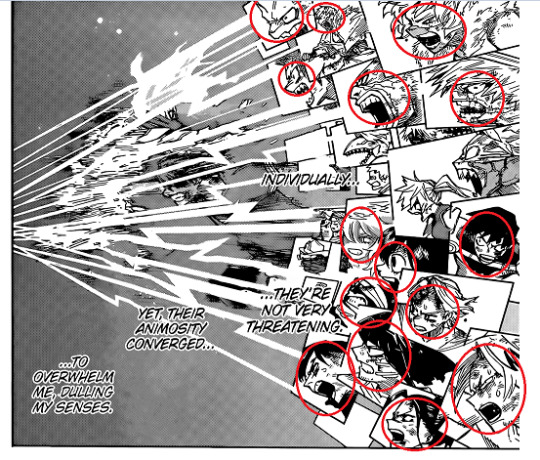
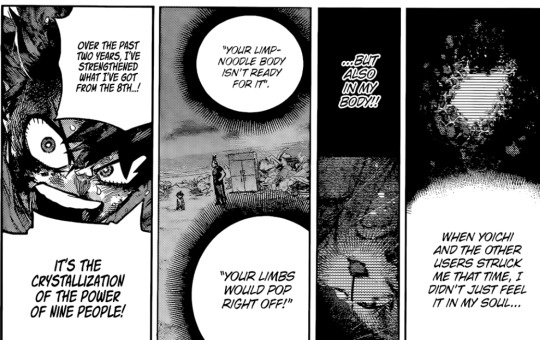
Deku punches the body of that little crying boy he yapped about saving of the big bad and it starts to crumble. So AFO looks for a new host in Deku.

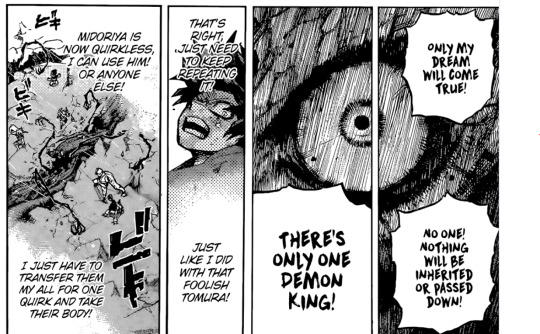
We get to the only good point in this chapter: as Aizawa is yelling for Midoriya, ShiraGiri worries about Tomura. The tragedy of how their lives went in separate ways. The only person on this battlefield who cares about Tomura is Kurogiri
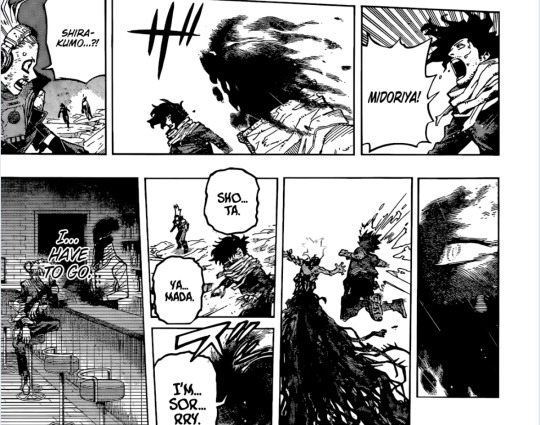

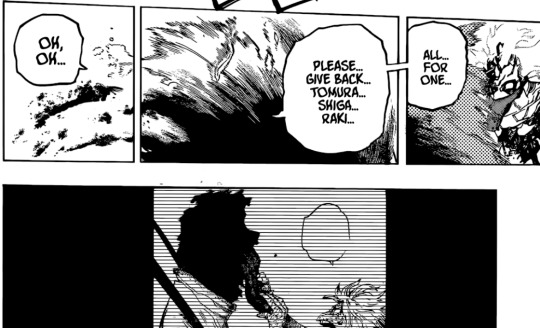

WTF - I'm emotional. This must help bring Tomura back, right?
Let me see! what's happening on the vestige side?
Is Kurogiri dead? Why?
I NEED ANSWERS!!!
Or fuck that - let's get to Bakugou, because why not. Obviously, he's in desperate need of another highlight.
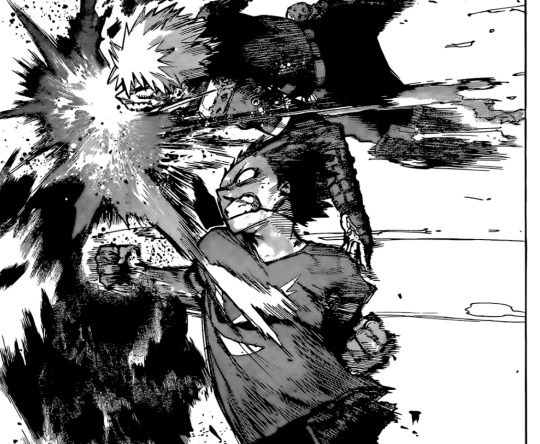
Let's even make sure he gets personally praised in case in the last 5 chapters he was not mentioned we forgot how he's the awesomest. Who cares about Kurogiri dying in the background? Who cares about Aizawa's or Mic's feelings? The most important question is how Bakugou got to the battlefield.
Oh, wait, here comes the twist. Remember that crappy little panel of Shoto in the last chapter? No? Don't worry. Neither does 99% of the fandom, except a few die-hard Shoto-fans.
Well, you see, that crappy panel was actually Shoto being hidden as he lifted up Deku at the end of that long combo to give him his last push. And the one above, is not a BKDK combo but an Origin Trio combo. It's just cropped the same way BKDK shippers always crop Shoto out of any Trio pictures.

Congratulations, Kohei Horikoshi-sensei! What an amazing twist. You managed to write Schroedinger's Origin Trio scene! It happened, but maybe it never did. Thanks for stringing me along all these years through the rollercoaster rides of Origins and Risings. I'll take that playground from you and give it to fanfic writers who actually care about maintaining it.
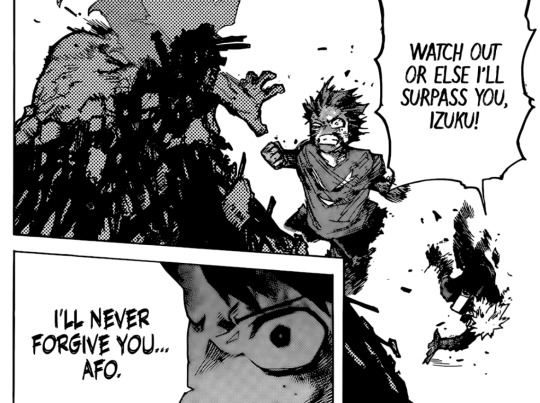
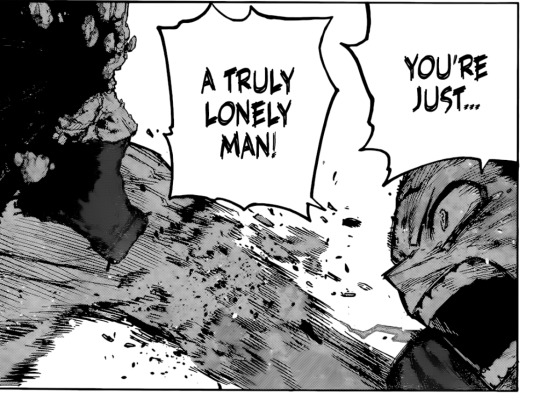
While Bakugou is yelling in the background, Deku is pulling a Mirio on AFO and calls him friendless. The worst thing that can happen to a Shonen boss.
There is some incomprehensible mumbo jumbo about OFA-magic - but don't worry peeps - it's all a set-up for Deku getting it back (in case you are one of the people who seems really to be worried about that)
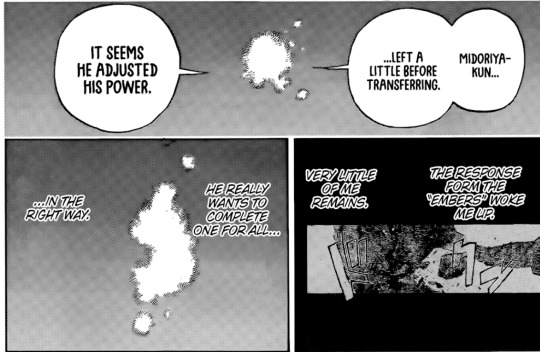
And then AFO realizes - due to Deku transferring the last bit just so - that he was just a sad little human who loved his brother all along. Yoichi's lifelong efforts to make an impact on AFO didn't do anything. Only the Jesus-Punch-of-Magic did. Too bad.
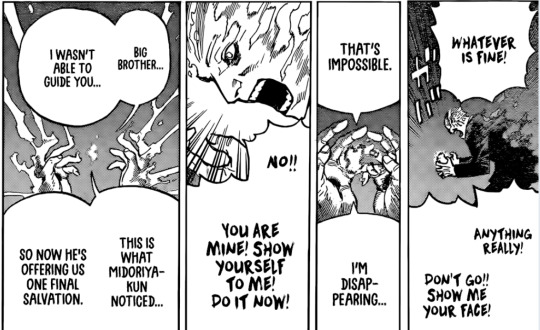
Oh no, the whole fucking peanut gallery is back to nobody's surprise. (Actually All Might is missing, which may suggest Deku will only get the stockpile back). Even if Deku gets OFA back, please don't transfer these guys back. I'm so sick of them. They were a total waste of time and took Deku's precious real estate for introspection. Fuck that. I don't actually care. Deku has been damaged beyond repair.
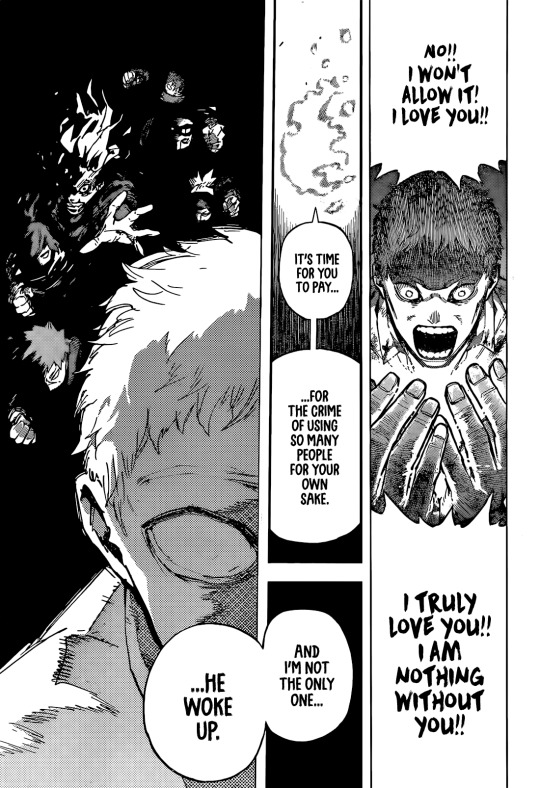
GROUP FIST BUMP!!! Amazing Climax. Maybe a double spread, Sensei?
HK: Sorry, I used up my double spread quota on Bakugou!
I'm not one to criticize Horikoshi's artstyle, but boy, this panel is so underwhelming compared to the stuff he drew in this endgame. Is this your big AFO vs OFA clash????
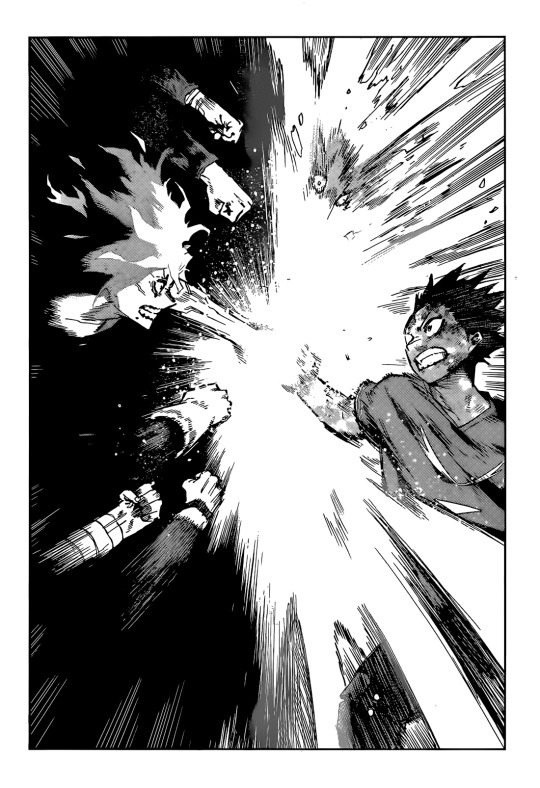
What happens when Ghost Fist collides with Real blood? Of course, it will transfer all that sweet Ghost-DNA!!!
Aka - Horikoshi is saying - Don't worry, Deku won't be quirkless.
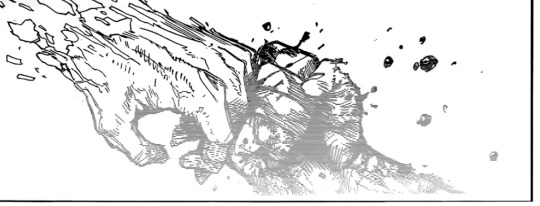
OK. Well. Let's move on.
Here is another line from Horikoshi's outline. Did you want to see a heart-warming scene between Nana and Tenko? Too bad for you. You get Bakugou, you voted for him.
(Btw, Shoto is not the only one who doesn't seem to be allowed to have a proper scene with his mom, I guess Tenko cannot even get an emotional afterlife scene. If you are an abuse-victim in story, Horikoshi says - fuck you! Take a swan dive and hope to be reborn as a bully in your next life).

Well, at least Tomura noticed that Kurogiri mysteriously died after Horikoshi couldn't think up an actual proper endgame for him.

OK, onto the MAIN ANTAGONIST's final monologue. It will be deep after being built for 400 chapters, right?
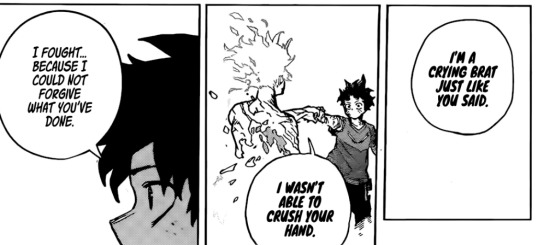

Shigaraki: Well, I didn't even manage to destroy your hand. I amount to just a crying boy.
Deku: Well, I still hate you for stabbing Kacchan and the others. (forget the others, I never cared about the others). I killed you because I was sick of your moping it's the International Board of Therapist's recommended therapy for victims of abuse and grooming.

Shigaraki: Well, what do I say to that. That's so fucking stupid.

Shigaraki: And to my gay little boyfriend, I leave my treasured Nintendo controller.
Deku: Yeah, whatever. I don't really have any thoughts. I've stopped introspection in Act 2. Your life sucked. You need to fuck off now and stop spreading the sadness, I have a victory punch to perform.
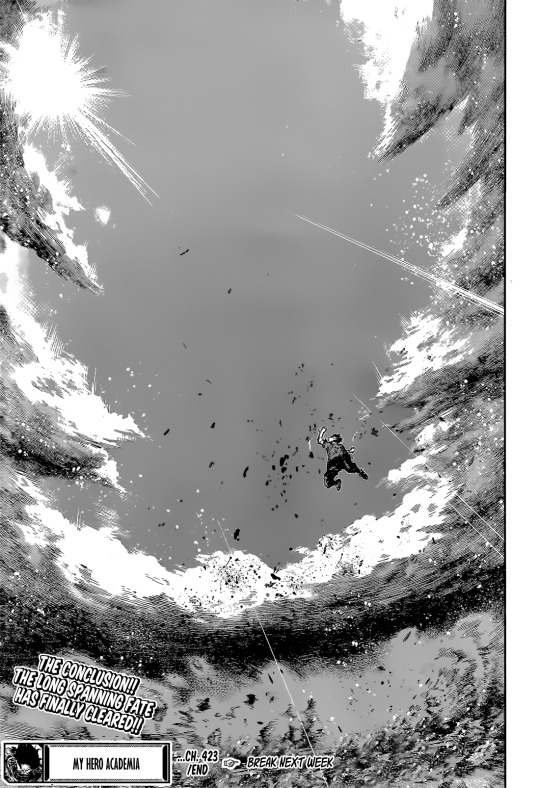
Deku: This is the story of how I became the greatest hero by punching the fuck out of this crying, abused little boy and then bathing myself in his nasty pixie dust. killing 2 main villains for the price of 1 in under 7 pages and changed the weather for the dudebros on Twitter can cry about the blue sky in the anime again. I also eradicated sadness with punching it hard enough.
Also - I probably still have a quirk. Tune in to find out in two weeks.
Sensei, with all due respect - this chapter was ass. Visually, thematically, from a storytelling point of view. Even the good ideas were executed badly or were crammed in with terrible ideas. What a fucking let-down.
Will Shigaraki go and be the hero of the villains?
I can see him reconstruct with Overhaul and magic, or I can see that we will get a reveal where Deku had the Lion Turtle solution all along and he has punched Shigaraki just at the angle to magically manifest 5-year old crying Tenko and save him and he was cold and aloof because he already "saved the boy".
I can see a BS solution incoming. But it will not fix this chapter for sure, nor the broader writing issues with Deku's character and with the Deku - Tomura dynamic.
#c1a reads bnha#probably for the last time#bnha 423#bnha manga leaks#bnha manga spoilers#midoriya izuku#bakugou katsuki#todoroki shouto#shigaraki tomura#kurogiri#aizawa shouta#afo#rooftop trio#bnha meta
251 notes
·
View notes
Note
look this is really probably unnecessary, but I've seen tons of posts about how everyone is mad about the page that's going to post unmasked pics of the st guys and how outrageously disrespectful it is to them and well... I gotta say that it's just not that deep.
it's been pointed out that they've only ever said that 'their identities aren't important to the music or the story'. and that's it in terms of the "extreme lengths" they go to hide their identities.
i'm a regular follower of the reddit page where their identities are openly discussed and there is a decent amount of evidence that one of them or someone from their team lurks there and plays around a little with that community. ie, a few of the recent "the summoning solo shenanigans" were suggested in that thread and then seen on stage the next show. but who knows.
some of the guys are actually still participating in other media to a small extent. one of them still streams with a friend on twitch often. one of them just put out some older official music project on Spotify. one of them gets his new tattoos posted unmasked on his tattoo artist's page.
look, I'm not saying that this person who plans to bring this stuff to Tumblr shouldn't be warned about and of course everyone should have the opportunity to block and avoid it to keep their experience of the band how they prefer. that's no question how it should be.
but like... everyone is saying that this person who's starting the unmasked blog is like, evil and so disrespectful to the band. and I think that's just not right. it's their right to start whatever kind of page they want. it's everyone else's right to avoid it.
like I said, this is not really going anywhere, and it's not personal, I just have seen so many people bashing that person on a personal level and I just gotta tell someone, it's not that deep. thank you for reading
To me it is that deep, from what i’ve heard there was a major panic on Instagram in 2023 bc freaks were using info on there to harass II and his family. Hell he still alters his voice in videos, which you only do if you’re concerned someone is dedicated enough to scrape the internet with audio of your vocal patterns. I’ve seen video footage of Vessel cussing out a guy at a festival for yelling real names in the audience. There is direct evidence that the band members dislike off-stage info being known and shared, and that a portion of Sleep Token’s fanbase cannot be trusted to respect the secrecy that allows the band members to live comfortable lives relatively peacefully and out of the public eye.
In my personal opinion, your examples of how they’re still on other social media, and that you know that info abt them are reinforcement of my dislike for unmasked data aggregates. Unless the tattoo artist’s posts or the twitch stream is tagged #SleepToken there is probably a reasonable expectation that they don’t want band related attention for those things. Even if somebody does recognize them as the band members, it would be a minority population if it weren’t for subreddits and archives directly connecting dots between those things and Sleep Token, which is presumably why you have that info yourself in the first place.
By aggregating and collecting unmasked info, a resource is being provided that essentially says “Hey i know these guys have almost entirely retreated from the internet for their own safety and comfort…but here’s their names and faces and loved ones and colleagues and past projects and every little activity they do in their spare time. All gathered together and directly tagged and marked in relation to the band they’ve purposefully tried to anonymize and distance their real lives from”.
It’s stalker behavior, it’s unhealthy, it could be genuinely dangerous for the members if the wrong person made use of it, and i reserve the right to passionately condemn it.
#my stuff#asks#sleep token#‘it’s not that deep’ is an incoherent excuse for collective behavior that qualifies as cyberstalking and identity doxxing
69 notes
·
View notes
Note
Americans' approval of Trump rose from 7% to 45% after his meeting with the Ukrainian president.
Let's see what the Europeans will do to Ukraine after the support tweets
NATO is nothing without America, This is the reality.
Dear Approval Anon,
I have no idea of your sources - you should be so kind and come back with substantial evidence, since I was not able to find anything remotely related to what you are so gleefully writing.

[Source: https://projects.fivethirtyeight.com/polls/favorability/donald-trump/]
I know the troubles (the 2024 bitter Silver vs. Morris pollster feud comes to mind) Project 538 has been through lately. I am merely using this as a very recent poll aggregator, and it is nowhere near the illogical, tragically idiotic 'Americans' approval of Trump rose from 7% to 45% after his meeting with the Ukrainian president' you so confidently seem to tout.
On which planet would a recently elected POTUS start his mandate with 7% approval rate? You do the math, you answer this - to yourself, because you'd understand I am not really interested by your flimsy justifications.
But let's break it down a bit, shall we, and follow the latest 10 day-trend, for the sake of fine tuning - same source as above:

I see extreme polarization. I see self-cannibalization of polls, depending on their Red/Blue funding. I see a slightly unfocused domestic context, in which emotions are not settled yet - and how could they be, since lack of predictability seems to be in fashion?
I could go on and delve into it. I am not going to. I am just leaving these figures here, as a testimony of your tremendous liberty with facts. By the way, your champion is not doing so badly overall (pretty stable even, at the moment), so you did not need to lie like a 5 year-old. You're not helping him and make a fool of yourself, in the process.
However, allow this European to answer your insinuating assertions. Thank you for the concern, I think we'll be just fine. You are perhaps informed that, along with a long standing Common Foreign and Security Policy, the EU has a fully operative Common Security and Defense Policy. Both are solidly enshrined in our Treaties and both had very tangible results, already.
I doubt you closely followed the results of last Sunday's London summit. On that particular occasion, the EU has been joined by other non-EU, NATO members, such as the UK, Norway and Turkey, along NATO and the EU Commission's Chairpersons. What we will collectively do in order to help Ukraine is exactly what we collectively did during the COVID-19 health crisis: pooling our resources in order to achieve a common goal. Some will perhaps send troops. Others will probably help with their infrastructure. All will pitch in and fund the defensive support mechanisms. It is in the making. It is going forward, like it or not. I will not further speculate.
I also think you are exceedingly naive to think NATO would not survive without America. It might morph, it might limit its geographical scope or redraw its security goals and means of action, or it might very well be replaced by some other alliance of like-minded countries. It happened before. It will happen again. While it would be regrettable, it would not be unheard of, nor fatal. But ask yourself if isolation is the right path for your country, many of us know and deeply love, when faced with a complex counterpart (I hesitate using a stronger vocabulary, given the recent evolutions), such as Russia. How is this going to agree with USA's Manifest Destiny foreign policy doctrine and its long self-perceived exceptionalism is yet another complex issue I do not have the will to further discuss.
I will simply say this: your view is biased by your own, news' consumer focused perception of Time. You think everything will happen right now, as we speak, because your habitual media outlet told you so. I will probably disappoint you, but diplomatic time is running much, much slower than your perception shaped by endless breaking news moments would ever comprehend.
And remember, Anon: your reality might not be my, or hers, or his, or their reality. The world did not start with Columbus. It will not end now, because of a tantrum on a couch.
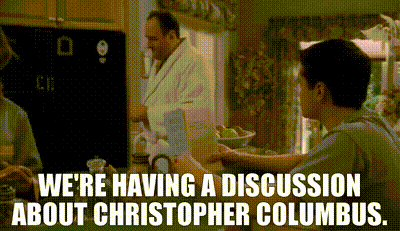
41 notes
·
View notes
Text
Bechdel Testing Ninjago

So, a little while ago I did the Bechdel test on Ninjago because I've always seen the show as sort of an interesting case study in how women are portrayed in cartoons. Of course, I'm aware the Bechdel test originated as a joke and something passing the Bechdel test doesn't make it feminist/not. Rather, or for me at least, it's an indication of how deficient female representation can be at an aggregate scale. As a way to analyze Ninjago, I feel it works as it shows how female representation over the course of the show. If you're interested I'll now discuss my thoughts on how the analysis went season by season. DISCLAIMER: I did this for fun.

The pilot was easy. Nya's the only one, so test failed across the board. The first episode that passed the test was when Jay's parents came to visit. Yay Edna! Mystake does show up in episode 7 but, I don't count it as she has not yet been named. 12&13 had a kid's mom in a bus which I decided was enough cus hey, Mom's a name she uses.

Here's where we really get going. Patty Keys, their real estate agent continues to show up through seabound as a background character, which is pretty cool imo. Episode 5, Mystake finally gets named. Episode 6 was huge for my chart as it's the introduction of Misako. You'd think episode 7 is when her and Nya talked but that's actually when Nya and Gayle had a lil convo. From then on I spent the episodes just staring at the Nya and Misako thinking "talk to her talk to her talk to her." Fortunately, when they did speak, Nya and Misako would be discuss like science, maps, and fate of the world so I never ran into a problem with rule 3. That is, until Rebooted.

The good news is Pixal's here so it'll be years before we fail rule 1 again. The bad news is we've got a love triangle so goodbye rule 3. Nya actually talked to her student, Sally, and Pixal quite often but it was so often about Jay or Cole so I would just be scouring the episode for a single exchange where they talked about anything else. During the Tournament, Nya, Pixal, Skylor, and Misako were all in different groupings and it was rare that Tox or Camille would say something so no rule 2/3 successes until late season.

The good news is, the love triangle is over so we're back to rule 2 usually meaning rule 3. The bad news is, Pixal's in Zane's head so we're back to hoping Misako and Nya say something to eachother. Nya usually shared her scenes with Wu, Ronin, and Jay during these seasons so chances were few and far between. However, unlike the first few seasons where the default was male, we're now getting some female henchmen (Bansha and Dogshank) so that made things easier.

Thank you for being in Day of the Departed Edna Walker. Early Hands of Time was tough because Nya, Misako, and Commander Macchia were rarely in the same scenes. In the latter half of the season though, we thankfully see the return of Pixal. Maya also helped us with some wins.

What a breath of fresh air. Thanks to Harumi & Ultraviolet's introduction, Pixal's return, Mystake's upgrade to a reoccuring character, and Nya & Misako's continued support, failing even rule 3 is pretty rare during the Oni Trilogy. We run into some complications during Hunted because though we have Skylor and the aforementioned characters in Ninjago and Faith & Jet Jack in the First Realm, sometimes people don't talk to eachother. And that's ok. Overall, smooth sailing.

Ah??!? What happened. Worry not. I realized this was, in part, because the Oni Trilogy had 20 minutes worth of chances for women to speak to eachother, these were only 10 minute episodes. So, for the sake of comparable units of analysis, I considered each pair of episodes to be 1 episode. I'll show both charts until DR.

It looks a little better, but it's still not at Oni Trilogy levels. Still, I'd be curious to see what the test would look like if I dissected the earlier episodes into 10 minute chunks because it's probably not a great sign if 10 v 20 minutes makes such a big difference. Ok, proceeding. The Fire Chapter was usually pretty successful because Pixal, Aspheera, or Nya would usually end up talking at one point or another. Gayle even helped at one point. The Ice chapter usually achieved successes through Nya talking to Sorla. In one episode, I counted the Preminent's roars as conversation with Pixal. The Ice Chapter had quite a few failures largely because, as in previous seasons, all the women were split up.


Despite the fact that Nya was one of the longest lived ninja, Prime Empire has total failures at levels not seen since before season 2. This is largely because for the most part, Pixal and Nya are never in the same episode. Racer 7 helps but she was only there for a bit. I should point out that I feel like the 10 minute era is really when Pixal starts feeling like part of the team to me. She's always part of homebase meetings and always plays a key part in missions. Alas, if she's not in episodes with Nya, that's not going to show up on my chart. It's a reminder of the fact this test doesn't show substance.


Master of the Mountain is similar to the other seasons of its era. The fact the 10 minute era tended to show its plots episode by episode (ex: Ep 3 = Plot A, Ep 4 = Plot B, Ep 5 = Plot C) rather than all in one really takes a toll on the test. For the most part, Nya and Vania were our only chances for success and it was rare they'd share an episode. We also had the rare rule 3 failure with the Queen of the Munce episode. Thanks Jay. The Island only had Nya until they found Misako, so it was struggling even more.


It feels right to see all green when it's a Nya season. In the beginning of Seabound, they put Nya, Pixal, and Maya on a boat together and by jove it made things easy. Late season was a bit trickier because Nya was on her own journey. Crystalized had Skylor, Pixal and some ressurected villains saving the day. Late Crystalized is the way it is because it had so, so many different groupings. I have a chart based on groupings and this season was such a challenge.

I really felt the difference with Dragons Rising. I mean, you can see the difference, but it was even more clear when doing my data collection because it was just so easy. Rather than grabbing at scraps of dialogue like I had to do in early seasons, there was often a wealth of more meaningful conversation between female characters to choose from. As with the Oni Trilogy, a female villain with a female henchman makes things easy because they scheme together. We also had Nya and Sora on a joint quest. Funnily enough, there is a rare rule 3 failure because Sora and Kreel only talked about Kreel's friend in one episode. Episode 17 had the classic split up issue and actually would've failed entirely if not for Agent Underwood, which is actually a great example of my next point. You can really tell how male is no longer the default because not only is there the introduction of all the fantastic new female main characters, but also there's plenty of random female characters scattered throughout. I haven't seen DRS2P2 yet but I expect it'll be more of the same. I should mention I also made a chart with the reverse (two named men in an episode who talk about eachother about something besides a woman). Only three episodes fail in any capacity. (Say thank you to the Akita, Pixal, and Harumi solo episodes). If you read this whole thing, thank you. I had a lot of fun doing it. Let me know if there's any other charts I can do!
104 notes
·
View notes
Note
No worries if you genuinely have no idea about this, but do you think bird flu has the potential to become as bad as or worse than covid? So far, it seems to mainly only spread from animals to humans but I've heard that a lot more cases have been popping up recently so I'm nervous about it turning into a full blown human to human pandemic.
From what I've heard from working epidemiologists on Twitter, California is the only state that has been even partially proactive in testing and disease management. It's entirely likely many human to human cases are going untested and untraced because H5N1 has been in wild birds and some wild mammals from coast to coast since about last year (USDA has been tracking H5N1 wildlife spread since late 2022, starting in seabirds and seals if I remember correctly) and earlier this fall, there were multiple reports of poultry and diary workers with H5N1-type conjunctivitis who refused to quarantine or test and moved from state to state for work. That's not even mentioning the no known bird contact cases in Canada and several across the US. Even if there were some obvious cases of H5N1 presenting in hospitals, doctors by and large aren't testing for covid, flu, and RSV, and cases of RSV and Flu are rising right alongside Covid as we speak. Even if we weren't in yet another winter "tripledemic" ("quintdemic" if you count norovirus and whooping cough too), the Biden Administration has done it's damndest to defund some critical public health response apparatuses in order to cover up the persistent spread of covid. It's likely that by the time we confirm in a lab human to human spread, we will already have a full-blown epidemic on our hands, and then Trump will have the reins and his anti-public-health appointees will do their best to hamper the response because of the new amendment they'll pass giving Americans the right to raw milk. I'm being a little hyperbolic, but numerous epidemiologists and public health officials that I trust about covid have been growing more and more concerned with the lack of response to H5N1 among other illnesses. I don't think that H5N1 will be quite so bad as covid in terms of transmissibility and immune escape, and unlike covid we already have the tech and infrastructure to churn out flu vaccines, but I think the collective covid denial and demand to never have another Public health response ever again will make the impact more deadly in the start, especially because our hospitals are already at the brink of overwhelm before Covid has really kicked off for the winter. Sorry this was rambling but it's kind of flow of consciousness: there's a few years worth of reading and concern to sort through and I'm not sorting good right now.
This is my opinion as an aggregator of information and someone who's been watching the situation unfold for over two years now, not an expert. I'm not intending to frighten or spread misinformation, just saying right now is the time to invest in non-perishable foodstuffs, home necessities, masks, and maybe even goggles since spread via eyes is a concern with avian influenza. Be prepared, not sorry.
57 notes
·
View notes
Text
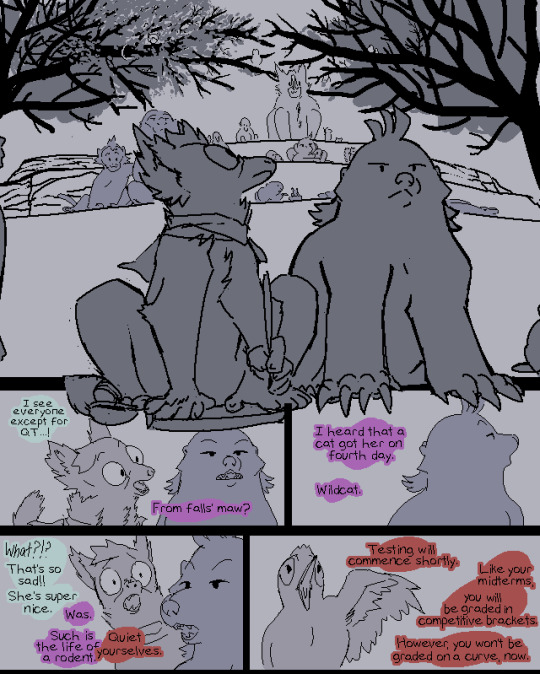
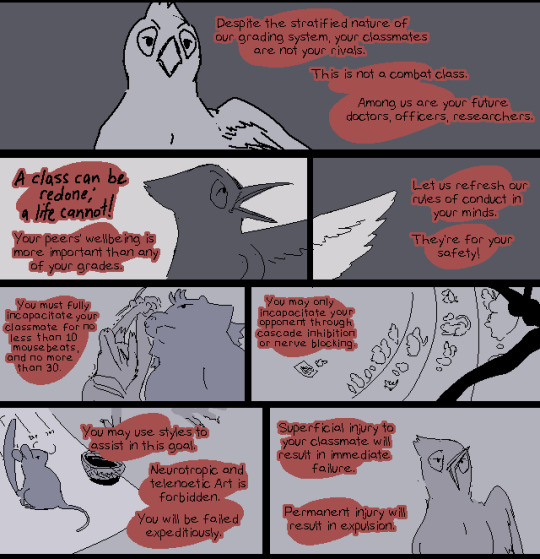
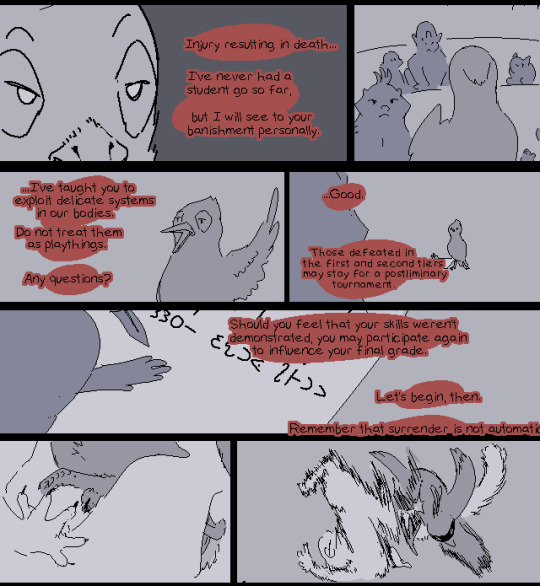
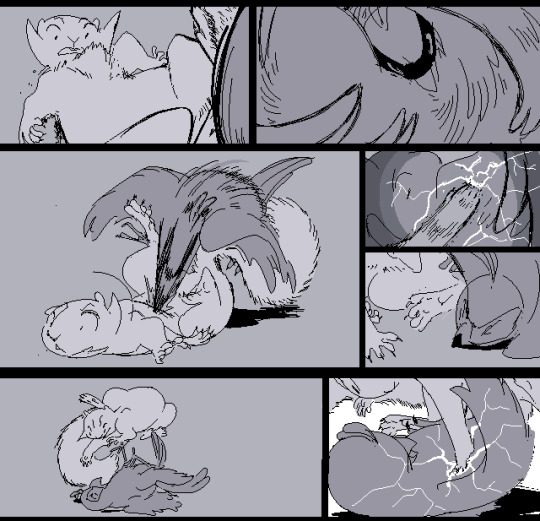
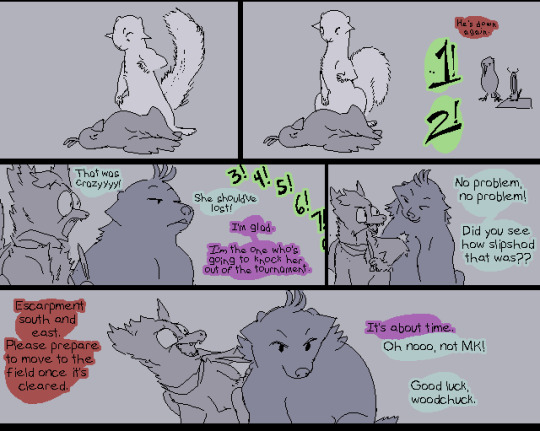
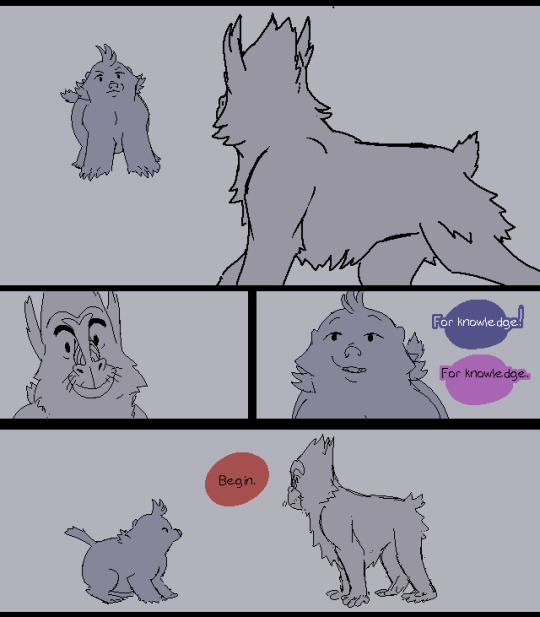
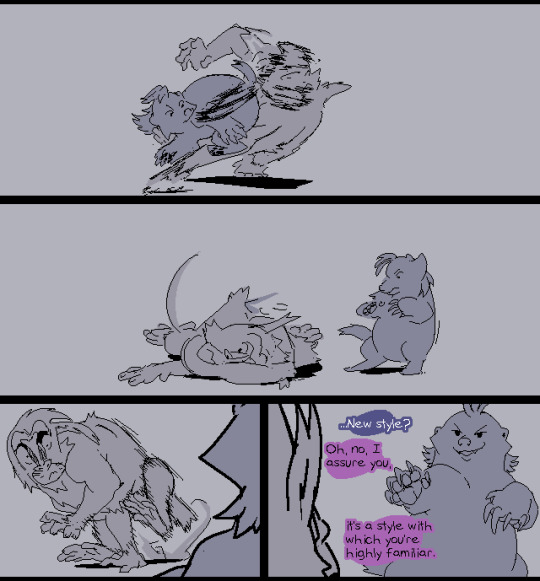
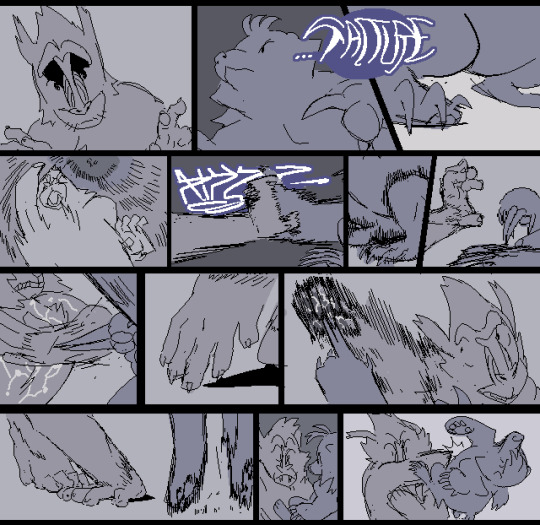
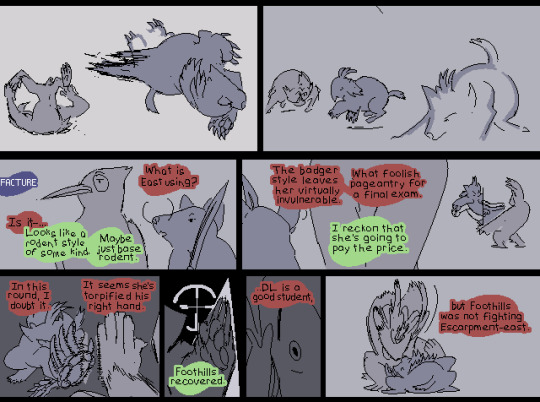
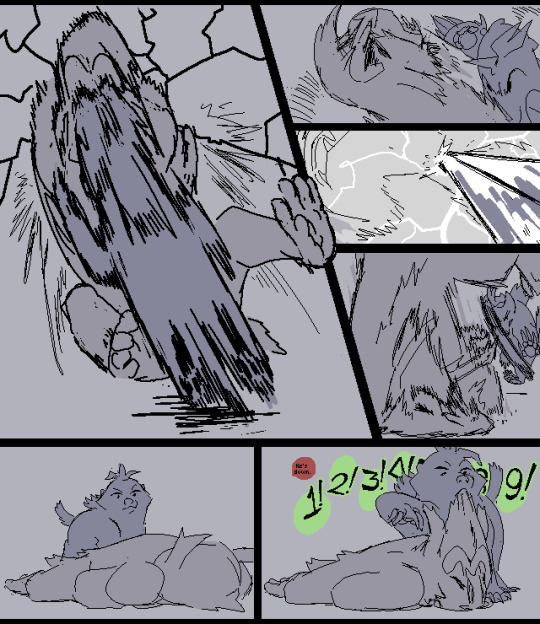
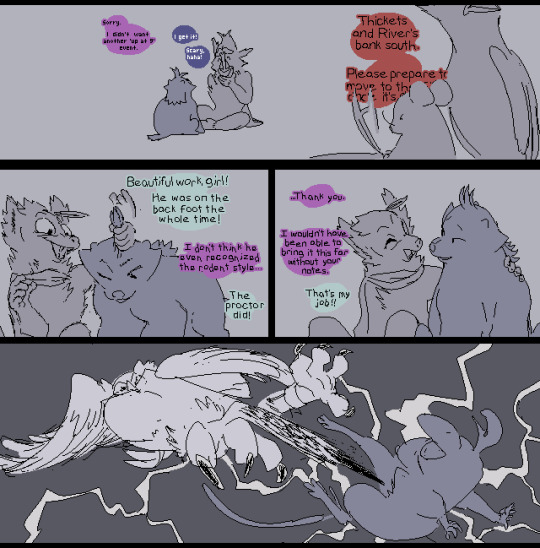
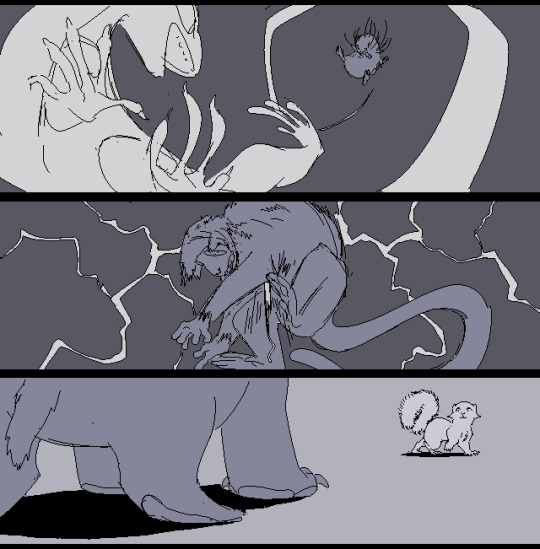
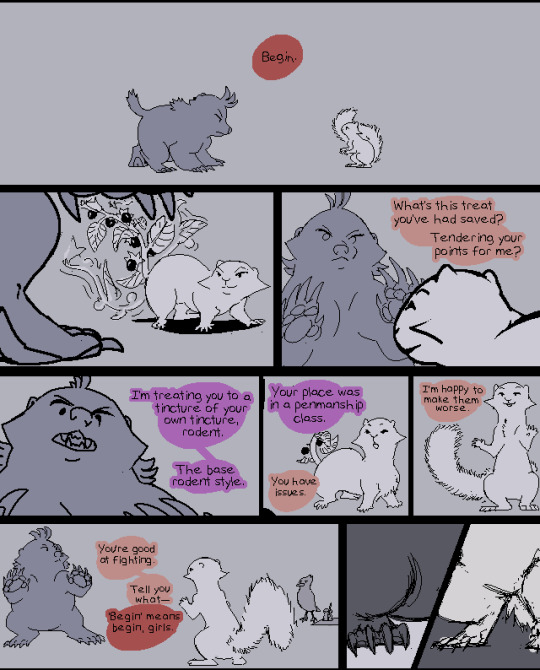
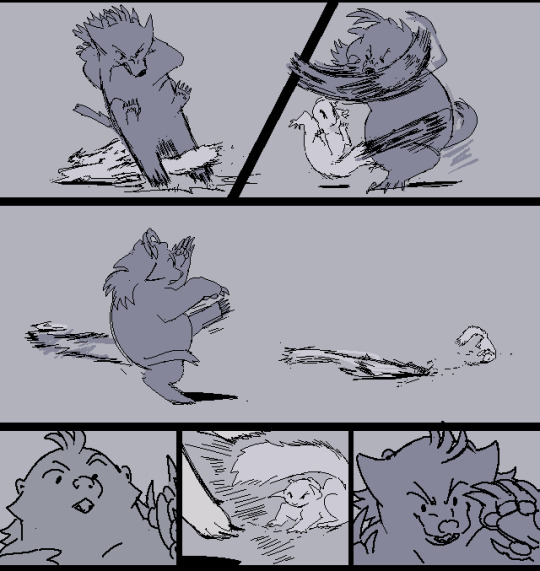
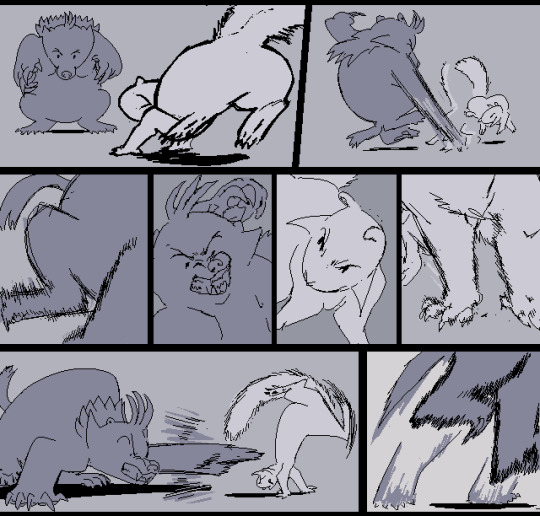
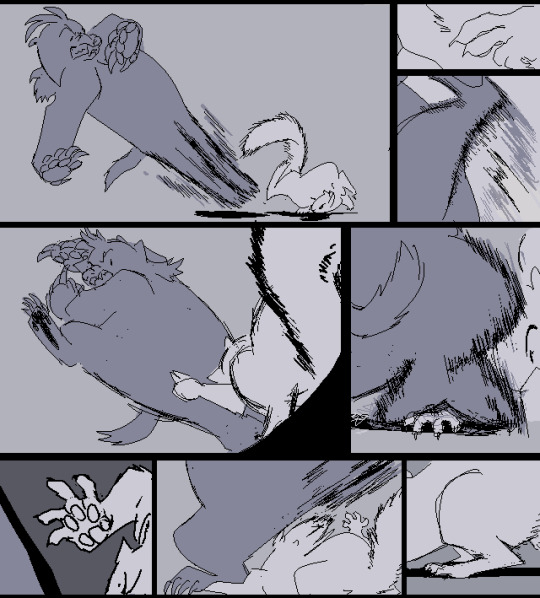
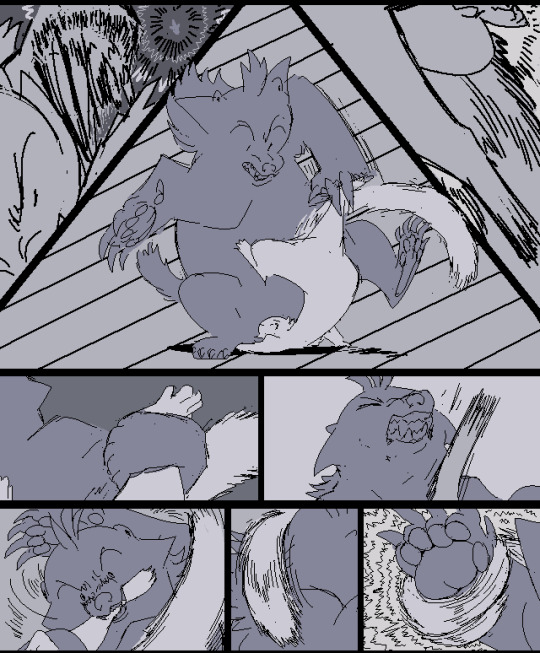
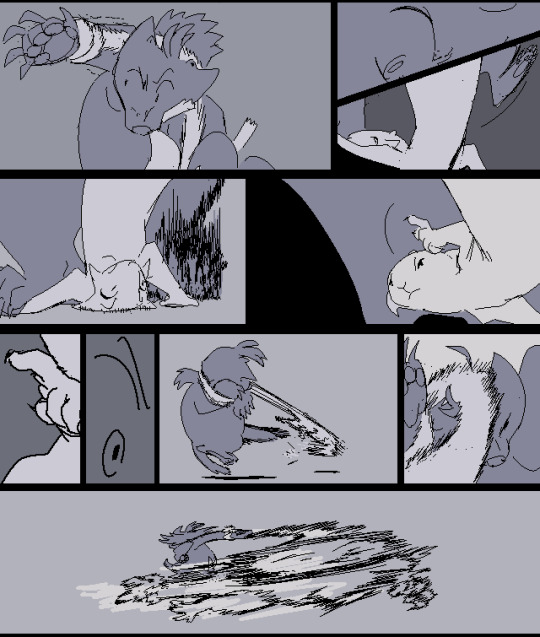
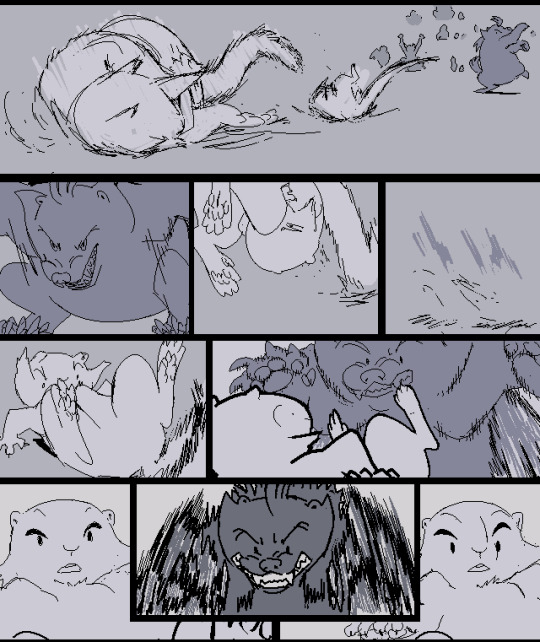
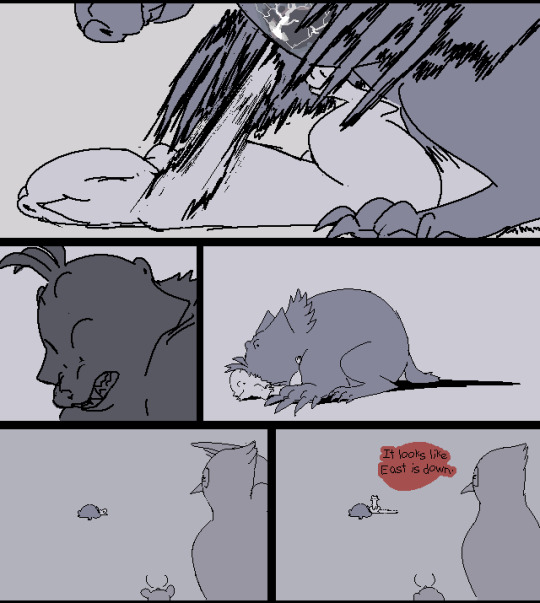
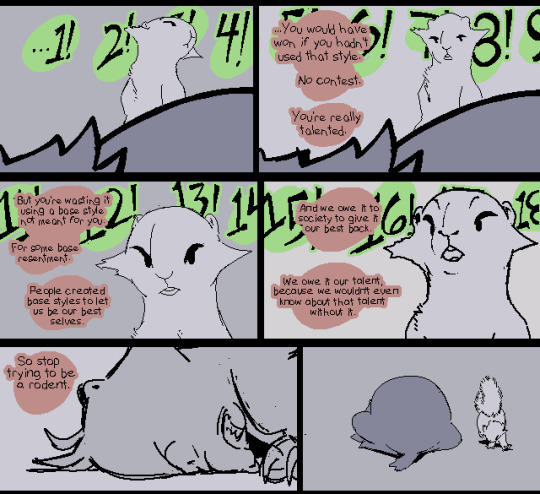
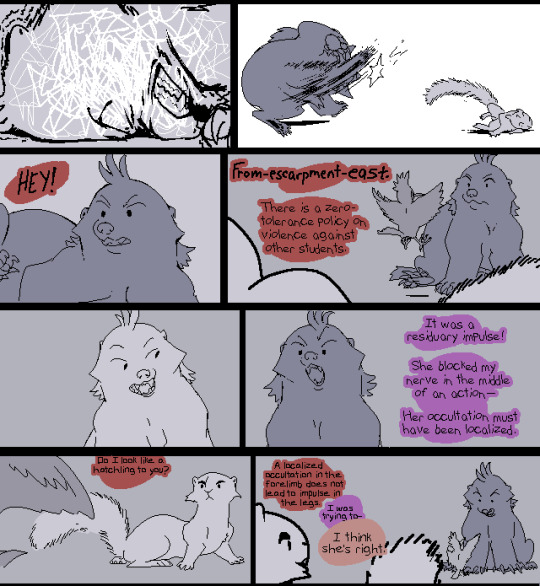
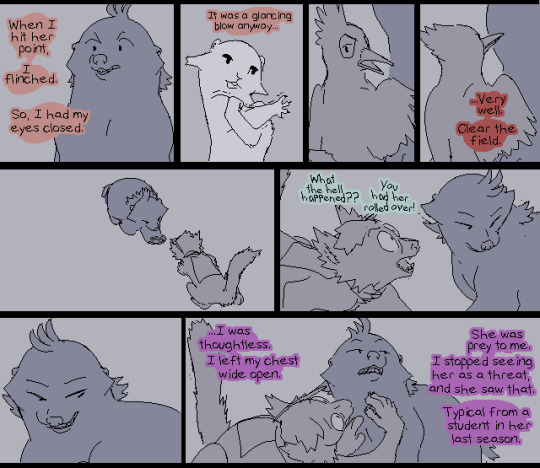
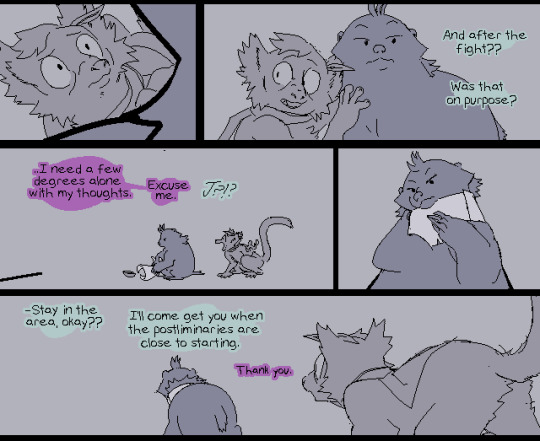
god this shit took forever to sketch. another NofNA emulation comic. it reminds me of the midterms in secretary, for obvious reasons, but Legend is sort of an inverse secretary situation, where she is exceptional at fighting, but wants to write.
let me see what i can remember...
PS, the blue-eyed black lemur, has been friends with Legend since their mutual first season at college, as mentioned above her reference sketch... they probably became more friendly after being paired up to peer edit each others' work. PS has since graduated from college and works as a markscraft. Legend frequently commissions PS to scribe for her, not only because they are friends, but because PS is one of the few markscrafts in the area who isn't a rodent. many primates go into law or medicine. mainly Legend commissions notetaking in classes -- she is too insecure to share her stories. PS has a more relaxed, informal personality, and i tried to get that across -- i think it's relevant to why she decided to become a markscraft instead of pursuing more intense study. still, i also tried to get across that they are good friends, not just scribe and customer, particularly with the amount of touching that PS does. the impulse to touch and groom is probably innate for her as a primate. there isn't as much information about her species, but in ring-tailed lemurs, lemurs usually only groom based on the strongest bonds, rather than more communal aggregate grooming as a sort of social currency. i honestly don't know what PS would need to note during finals, but i think Legend just Wanted her there anyway.
the bird, DL, fighting the squirrel, GG, is a grey shrike. i imagine him as an average student in the middle of his education, but i think he is in the class for combat purposes, because pressure point manipulation can be incredibly powerful, more so if from a less expected species like a bird.
mr. deciding is a much more serious, no-nonsense teacher, possibly due to his specialty. when you're teaching students how to explode a kidney with a handshake, you probably just play it safe and try to put the fear of god into them before any kidneys get exploded. i wanted this class to have a much heavier emphasis on safety of the participants than the class in secretary, with a more focused goal than "who can beat the shit out of each other better." i think the goal of fighting to show off knowledge here is still Fucking Insane, but it's just. their culture, i guess. you can technically "move" your pressure points, so being able to defend yourself by utilizing this knowledge can also show off what you've retained. the mouse next to him is a proctor, who is an extra teacher brought in to judge and often write for another teacher, but primarily as a peacekeeper and bouncer. in classes where a student can theoretically totally disable a teacher by just touching them once, the precaution is seen as necessary. the mouse is probably a combat-oriented point invocation instructor.
the mandrill, MK, is a first-season or first-year student -- i assume that one class, from midterms to finals, is a season, as secretary seems to start near autumn. midterms have snow, and finals are during early spring. anyway, that's tangential. i think he's very new to the educational system. i pictured him as a medical student. in his fighting style, i made him more defensive; he doesn't really know nearly as much about attacking an opponent in a fight. he does think at least about his opponent's most immediate reactions, but doesn't have enough experience with fighting to think ahead to the degree that Legend does. you can see him make the same mistake that Legend did against Machinations, which disables his non-dominant hand. needless to say, he will probably always be aware of headbutt proximity now. he attempts to use two factures in the fight within a style meant to evoke debilitating vertigo by manipulating the connection between the occular, vestibular, and proprioceptive systems. it's obvious that he created the style from his medical classes. it is fairly empty as far as styles go. interrupted facture: nystagmus, which causes the world to spin around the opponent by involuntarily twitching the eyes back and forth. second facture: strabismus, which misaligns the pupils, primarily impeding aim. denied by Legend because a honey badger does not rely on vision or a vestibular system as much as a primate does -- not something he really considered when making the style. factures that never ended up being used: pursuit, which forces the target to follow a spinning image of themselves instead of looking where they should; and mask's lasting, which forcibly initiates saccadic masking, suppressing the intake of new visual information altogether.
the large bird is a bateleur. the mouse is just a regular house mouse. the lizard is an ornate sandveld lizard. the opponent of the lizard is a common mole-rat, also called an african mole-rat (even though most species of mole-rats live in africa). the monkey god i'm not super sure but i believe it's just a vervet monkey. the other mouse is also a common house mouse.
GG is a second-year student, which is the last year for a rodent. i think she's been kind of aimless -- she thinks incredibly fast as a squirrel, and finds solving problems in the moment to be a much more successful endeavor than trying to plan ahead. she doesn't worry about the future and doesn't ruminate on the past much. she's aware that she isn't the best ever and doesn't apply herself as much as others, but it also doesn't particularly bother her. kind of ironic, given the aesop she slops onto Legend after the fight. i imagine that she will eventually choose the name Serendipity. i tried to write her lack of foresight, but compensatory quick thinking in both fights. like the shrike, GG is a combat-oriented student. the style she briefly introduces at the beginning is called fanciful flower's delightful blight. it is based on the deadly nightshade flower and its berries -- which are toxic, obviously, and a hallucinogenic. squirrels flick their tails for many reasons, and the most common reason is simply a default flicking to attract predators. their tails are designed to "deglove" easily; if a predator lunges for their tail, which is the moving part of them, the skin and fur will tear off, and the squirrel can escape. delightful blight utilizes the attention-grabbing flicking of the squirrel's tail as a nightshade plant to induce a trance-like state. the berries represent temptations so much more pleasing than what you ought to focus on. a nice berry and a flower to smell are so much nicer than struggling in a fight. even when you resist them, they linger in your mind, and "plant seeds" when the berry falls as self-restraint is worn down over repeated abstinence from the temptation. factures induce hallucinations and nausea. she primarily uses the base rodent style to fight Legend here, but also uses base squirrel style twists, which include more acrobatics, backflipping, and contortions.
the two things that really catch Legend off-guard use limbs that she doesn't have, and most opponents don't have -- elbows long enough to use defensively, and a long, rope-like tail. she is otherwise supposed to be fairly adept at analyzing what an opponent will do, usually a few steps ahead, related to her ability to fabricate narratives quickly. you can see her also come up with a lie for kicking GG fairly quickly... she was going to say the impulse was in her legs because she was trying to move away from GG's strike.
anyway if any part of this fight is like... unfathomable i can probably explain. i've already been typing for way too long, lmfao
#nofna shitposting#partaking in the act#basically legend left her chest open because she expected GG to attempt to block#instead of considering that GG could take an offensive action instead
177 notes
·
View notes
Note
Do you know of a decent place to see which phones still work well after years? I'm noticing pretty damning performance issues with my Xperia meanwhile my razer phone 2 is still chugging along!
Longevity is kind of double edged, there's update support and there's raw performance. For update support, there's EndOfLife which has details for a few brands, and you can otherwise usually find a recent list pumped out by an aggregator site if you search "Update Support <Brand> Phones". Just because support is long doesn't mean it'll necessarily run well, (Samsung has long support on even their slowest phones) but it's a start.
For performance, the flagship phones with high end processors and tons of RAM do a lot to future proof a phone against the increasing resource demands, so your best bet is often just benchmark results relative to those.
GSMArena will usually have GFXbench or 3DMark and GeekBench results for phones. Versions change often but, you can usually look at like, the contemporary Samsung S or S Ultra whatever which is pretty reliably one of the fastest fast phones of its generation and see how what you're looking at stacks up. e.g. here's a Nothing 3a pro vs the Samsung S25.

Huge performance gap! GeekBench and AnTuTu are sort of holistic usability benchmarks, while 3DMark is mostly gaming focussed. Here's my phone (Pixel 8) vs its contemporary S24. Now that I mention it, contemporary pixel is also a good "middle of the road" benchmark for recent generations.

No good graphics comparison, but you can see, ~65% performance give or take in general use. This also shows you how big the inter-generation gap was this time, pretty big!
Another thing that matters more than you might think is storage. Modern phones use eUFS 2.x or eUFS 3.x, both of which are high performance flash standards and which are a huge step up over older eMMC storage. Slow flash like eMMC dramatically affects app performance and only makes it worse if you run out of memory and have to hit swap. Snappy app transitions under Android involve a lot of careful memory management and swap usage so slow storage can really highlight that. GSMArena will usually list the flash standard a phone is using.
Memory has a much narrower spread these days, even the cheapest new budget phone will usually have 6GB of RAM, but getting 8 or 12GB will help reduce swapping and improve caching for application launching and multitasking.
23 notes
·
View notes